#he has been consistently throughout the series and it never ceases to impress me
Explore tagged Tumblr posts
Text
Guess who just watched the entire first two seasons of Young Justice in two weeks! This bitch!
#and im now starting episode 2 of outsiders#ive tried avoiding spoilers so i uh hAD NO IDEA HOW DARK THE THIRD SEASON WOULD BE??#and im starting to think it may have been a bad idea (not really just makes things worse to see all my little kids grown up in 2 weeks lol)#part of me is only watching for dick grayson rn#i love him so much#and goddamn his voice actor is phenomenal#he has been consistently throughout the series and it never ceases to impress me#but i just...... miss Robin :(#wheres my mischeivous boy? who knows#i swear to god my life will be complete if they just put one (1) whelming joke in season 3 like listen im begging you#gimme a good old dick grayson cackle#im just..... really feelin it. this is the most obsessively ive dived into something ....... oh god i think since four years ago when i#joined the phandom HOLY SHIT#im just feeling extremely emotional#ALSO I LOOKED IT UP AND FOUND OUT THAT WALLY’S VA IS STILL IN THE SHOW JUST AS A DIFFERENT CHARACTER#AND THAT MAKES ME SO HAPPY THAT THEY KEPT THE ACTOR!!#the gang really is all back together wtf :’)#i think season 1 was my favorite.... it was the most lighthearted and the least complicated and i personally just like the original team#dynamic much better than the team with 20+ members#god they changed SO MUCH for S3 its scaring me?? the justice league is falling apart and m’gaan’s new form is weird?? imo? why’d she go back#to her fake ‘true form’ she used one time in season 1?? maybe they’ll explain that#but i do think it’s cool that she isnt green anymore so she can be herself (altho i do miss green m’gaan lol)#sorta hate how they had to give dick a Chiseled Manly Jawline bc hes a Man Now but w/e#i love S2 nightwing dont get me wrong but by far the most superior dick grayson for yj is robin. there literally is no arguing otherwise#k im done now <3#EDIT: HOLY FUCKING FUCK GOD FUCKING BLESS YOU DC (how could i have ever doubted that you wouldnt make dick make an ‘aster’ joke only two#episodes in. fuck yes. god im gonna cry im so all over the place sorry)#mine#young justice#just some thoughts
0 notes
Text
Episode Spotlight: M*A*S*H, Season 1, Episode 17: Sometimes You Hear the Bullet
Frank Burns throws his back out and applies for a Purple Heart. Meanwhile, Hawkeye Pierce meets, and later operates on, an old friend and struggles with the decision of whether or not to send an underaged soldier home.
More than halfway through season 1, M*A*S*H wasn’t exactly killing in the ratings. The show wasn’t quite sure of itself yet, with tons of recurring characters that would end up dropped and other characters not yet added to the main cast. Airing at eight o’clock on Sunday nights, M*A*S*H was, at this stage in the game, a relatively normal sitcom, albeit one with a bit sharper sense of humor.
That all changed with Sometimes You Hear the Bullet.
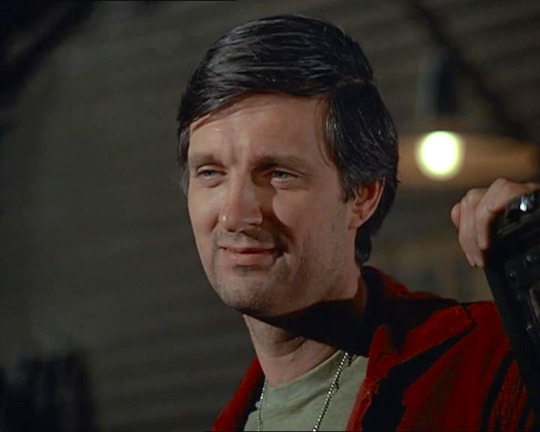
I’ll show you what I mean.
The episode starts humorously enough: Major Frank Burns throws his back out during a rendezvous with Major Houlihan. He is placed into traction, where he applies for a Purple Heart for his ‘injury’. Meanwhile, Hawkeye is visited by an old friend and kindred irreverent spirit: Corporal Tommy Gillis, a journalist who signed up for the front lines as he writes his book: You Never Hear the Bullet, a book meant to be written from a soldier’s point of view, instead of a reporter’s.
A helicopter full of wounded arrive at the unit, and Gillis returns to his post.
Among the wounded is a young man with a burst appendix, a Private Wendell Petersen, who is very anxious to get back to the front lines. Hawkeye tells him that he has to rest for a few days before returning to his unit. This doesn’t stop Wendell from attempting to steal an army jeep to try to get back, afraid that he was going to be sent home.
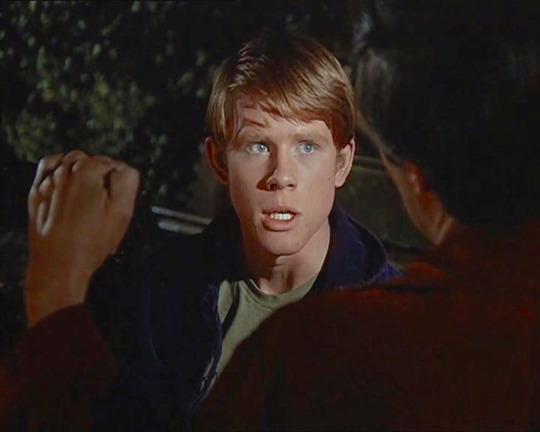
After talking with him, Hawkeye figures out the truth: Wendell Petersen is actually Walter Peterson, and he’s not even sixteen years old.
It turns out that Walter posed as his brother, Wendell, and entered the war to impress his girlfriend back home by returning with a medal. He begs Hawkeye to keep his secret, and, after returning him to his bed, Hawkeye agrees.
Shortly, more wounded arrive, and among them is Tommy Gillis. Hawkeye operates on him, but even his best is not enough, and he dies on the operating table after telling Hawkeye that he did hear the bullet. Hawkeye tries to revive him, but Colonel Henry Blake orders him to move on to save another life.
Afterwards, Hawkeye breaks down crying.
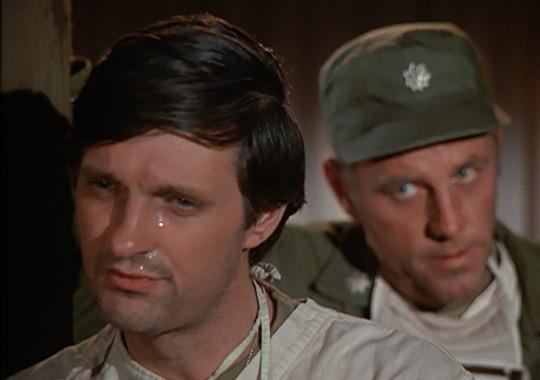
“Henry, I know why I’m crying now. Tommy was my friend, and I watched him die, and I’m crying. I’ve watched guys die almost every day. Why didn’t I ever cry for them?”
“Because you’re a doctor.”
Hawkeye asks what that means, and Henry answers with one of the greatest lines in the show’s history.
“I don’t know. If I had the answer, I’d be at the Mayo Clinic. Does this place look like the Mayo Clinic? Look, all I know is what they taught me at command school. There are certain rules about a war. And rule number one is young men die. And rule number two is, doctors can’t change rule number one.”
Right then and there, Hawkeye decides to change rule number one in some small way, and calls the MPs on Private Wendell, really Walter, outing the fact that he’s underage. Walter, outraged, tells Hawkeye that he’ll never forgive Hawkeye for the rest of his life.
Hawkeye replies: “Let’s hope it’s a long and healthy hate.”
In one final scene (one that’s usually cut from syndication), Henry Blake begins to present Frank with his Purple Heart, only to find it replaced with a purple earring, while outside, Hawkeye pins the Purple Heart on Walter to make up for turning him in, sending him home, but home a hero.
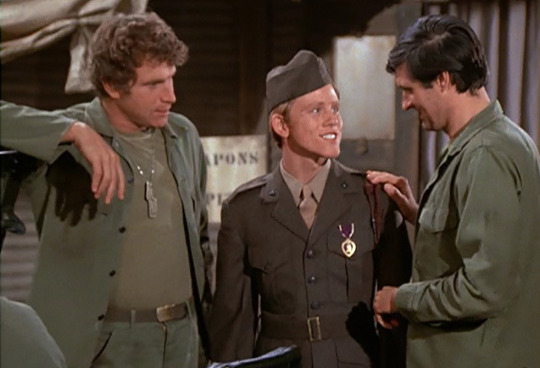
The end.
Sometimes You Hear the Bullet is considered one of M*A*S*H’s best episodes for a reason. This is an early episode, one that is regarded as a tone and trend setter for the rest of the series in terms of both storyline balance (one or two serious plotlines, one humorous), and content itself, one of the first episodes to sit down and truly explore the characters within this tragic situation. At this moment, M*A*S*H ceased being a comedy show and became a dramedy, with one of the most memorable moments and exchanges in the show’s long history.
While this episode may seem like a standard half-hour of television, at the time, especially for this show, it was something different. It was no longer a slapstick grittier Hogan’s Heroesque irreverent comedy about soldiers, it was a show about a group of people stuck in the middle of a war, with death all around them. And no matter how good Hawkeye, or any of the doctors, are at their jobs, they’ll never be able to save everyone.
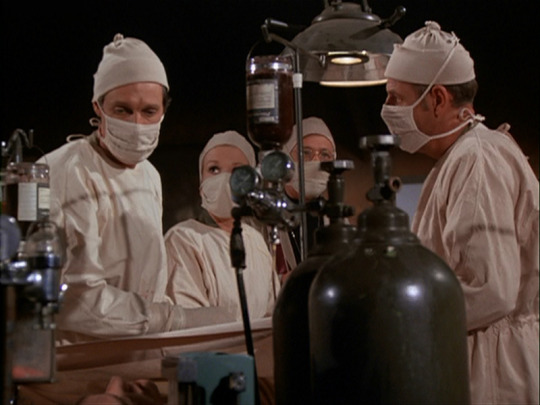
It’s sobering, but it’s a truth that the show had, for the first time, truly explored, and it’s that initial exploration, that glimmer of what this show was going to become, that puts this episode under so much recognition: Sometimes You Hear the Bullet was the warning sign, the first moment that the writers got a handle on the show that would become a classic.
Of course, it has it’s problems.
Not tonal ones, at least, not exactly. Throughout its entire run, M*A*S*H often had two or three plots going, one serious, one humorous. This is a smart strategy: balance out the dark with the light, giving each episode a more even feeling instead of being too much one or the other. Although the show would get darker and more serious as time went on, the writers never abandoned this plan, allowing M*A*S*H to remain a consistent dramedy throughout the show’s run, keeping the audience laughing and crying at the same time.
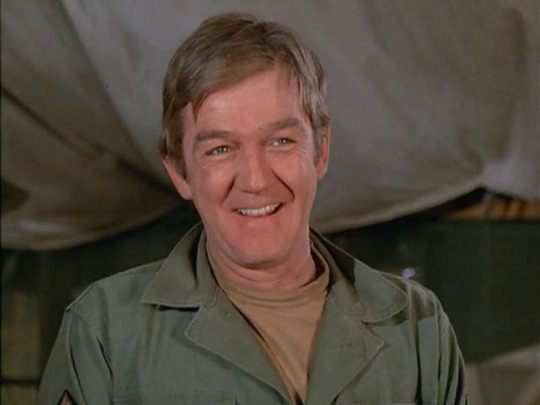
In the case of Sometimes You Hear the Bullet, the ‘funny’ subplot is obvious: Frank Burns and his Purple Heart. The other two storylines are the serious ones: Hawkeye’s friend, as well as the underaged soldier. However, in most cases, as in this one, these plotlines inevitably intersect, and it’s here that this particular episode might cause a few problems.
I mentioned that the final scene in the episode is typically cut from syndication: the sequence where Frank’s purple heart is stolen and given to the underaged soldier, instead. While this scene may not, at first, seem inherently out of place within the context of the rest of the episode, swinging from comedy to drama within a minute, there are those who believe that this scene unintentionally undermines the rest of the episode, or the main thrust established a few moments earlier.
And those people aren’t exactly wrong.
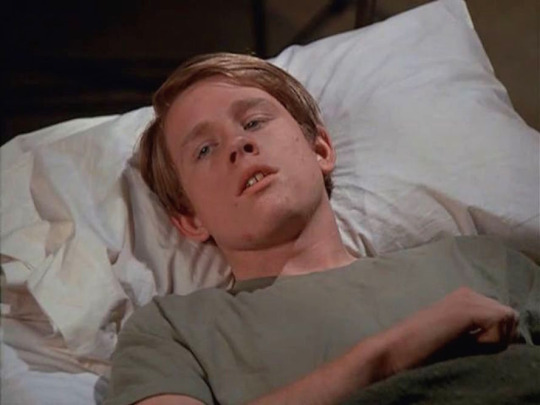
I certainly agree that the episode would have been stronger had it ended with the soldier’s final interaction with Hawkeye been proclaiming his hatred, only for Hawkeye to soberly respond that he hopes it’s a long and healthy hate. Changing that to this new ending, where Hawkeye sends him home with a medal, seems almost out of character for Hawkeye, taking away some of the sincerity and severity of the message just a moment earlier. The idea that this soldier could bring himself to forgive Hawkeye so soon, before realizing what exactly he’d been saved from, seems a little disingenuous after the weight previously given to this subplot.
In later episodes, it’s possible, even probable that this episode wouldn’t have ended tied in such a neat bow. But that’s one of the things that’s so interesting about this episode.
Sometimes You Hear the Bullet isn’t the first episode of ‘true’ M*A*S*H as it would be remembered in the future, but it is the first episode where M*A*S*H comes into its own themes, looking hard at war, and the toll it takes not only on the soldiers, but on the surgeons, as well. Before this, for the most part, ‘characters’, friends of the cast, did not die on the operating table. Not when Hawkeye could save him.
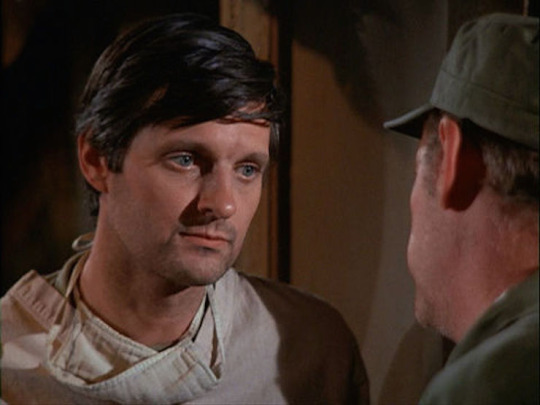
But I’m going to quote Hawkeye from another season 1 M*A*S*H episode, Yankee Doodle Doctor, as I think that it sums up this the point of this episode pretty well:
“Three hours ago, this man was in a battle. Two hours ago, we operated on him. He’s got a 50-50 chance. We win some, we lose some. That’s what it’s all about. No promises. No guaranteed survival. No saints in surgical garb. Our willingness, our experience, our technique are not enough. Guns, and bombs, and anti-personnel mines have more power to take life than we have to preserve it. Not a very happy ending for a movie. But then, no war is a movie.”
That right there is the point of Sometimes You Hear the Bullet, to the point where the doomed Tommy Gillis even references the film tropes of a young, fresh-faced kid hearing the bullet that kills him. This is the message that Hawkeye must grapple with: he cannot save everyone.
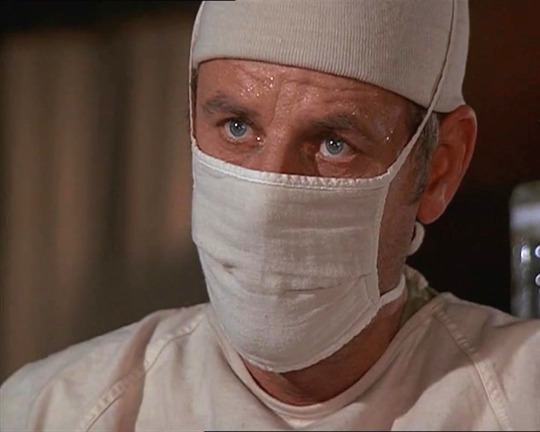
No matter how much he knows, how good he is, he can never save everyone. No guaranteed survival.
It’s sobering, but it’s the truth. And it’s what makes this episode so memorable.
M*A*S*H at this point was still mostly a comedy, a series full of jokes and the occasional serious moment, and it would continue to be so for another few years. But it was this episode, episode seventeen of the first season, that signaled to audiences that this show could be more than that. It could make you laugh, sure, but it could make you cry, and it wasn’t that surprising: this was war.
In short: by itself, is Sometimes You Hear the Bullet one of the greatest episodes of television, or even M*A*S*H, ever written? Maybe. Maybe not. But what it is, without much doubt, is the first sign of maturity in a show that had a lot of growing up to do.
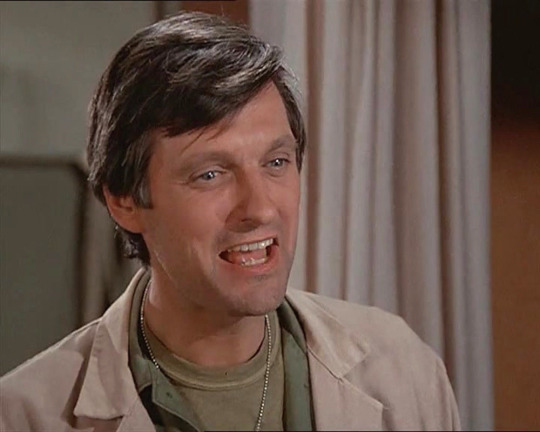
Whether the shift was instantaneous or not, the fact is, Sometimes You Hear the Bullet was a game changer in the show’s history, the first break in format that truly showed audiences what they could expect in the years ahead.
On top of that? It’s just a good episode.
The plot balance is decent, without too much mood-whiplash that could so easily occur in a war dramedy. The characters, decently familiar to audiences by now, all work off of each other just as well as ever, funny, interesting, and heartfelt in turn. It’s an example of early M*A*S*H at it’s best, overshadowing many first season episodes with a level of depth previously mostly unexplored, delivering on every scene and remaining mostly genuine. It’s an engaging episode, full of memorable moments that are thoughtful and earnest, making this episode a standout, a moment in television history, and an unmissable installment for avid watchers of M*A*SH, and television fans in general.
Don’t forget that the comment box is always open for anything from suggestions and discussion ideas to questions and conversations! Thank you guys so much for reading, and I hope to see you guys in the next article.
#TV#Television#Episode Spotlight#M*A*S*H#70s#TV-PG#War#Drama#Comedy#Alan Alda#Loretta Swit#Jamie Farr#William Christopher#Wayne Rogers#McLean Stevenson#Larry Linville#Gary Burghoff#Mike Farrell#Harry Morgan#David Ogden Stiers#Larry Gelbart
28 notes
·
View notes
Text
A Ponderous Rewatch: Jockey For Position
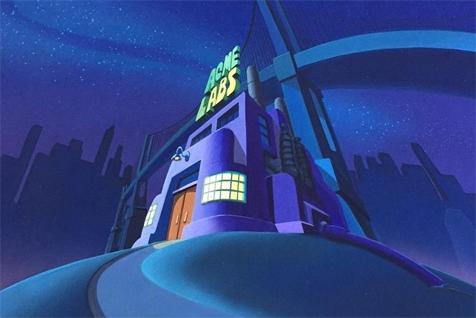
Now that we’re done with that long cameo, it’s time for our feature presentation for tonight, and it’s a doozy!:
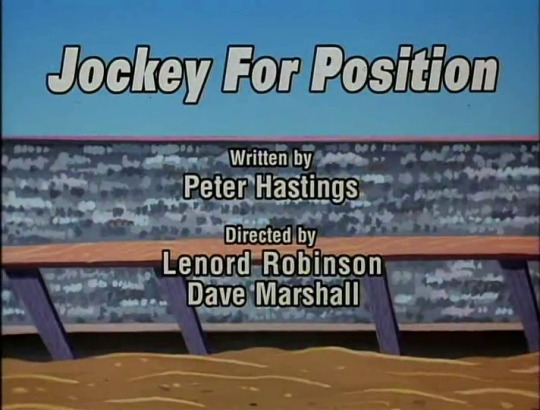
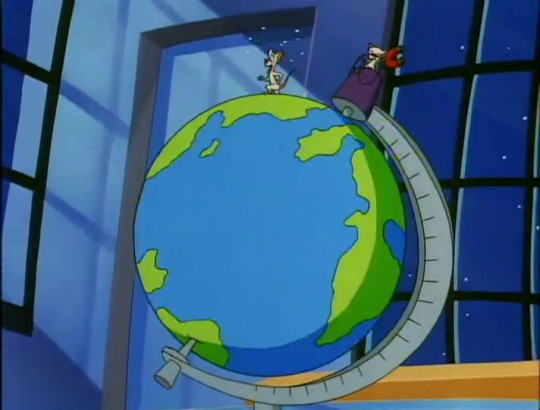
We open with Pinky frantically running on a spinning globe while Brain stands above him on the…globe holder? I don’t know if that part has a name or not.
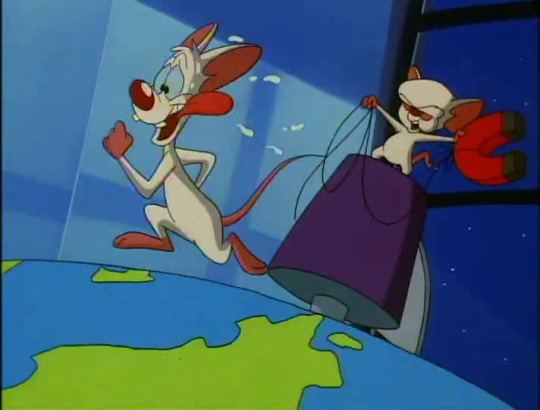
“[winded gasps] Can I stop now, Brain?”
“Not until I finish my demonstration.”
Brain, that’s just… Well I was about to say it was mean, but given that Pinky understands the details of his plans better when Brain demonstrates it or draws elaborate diagrams, maybe it’s for the best? I doubt Brain could make that large globe spin just by using his hands, and Pinky’s been seen a lot of times running on the mouse wheel in their cage so he’s gotta be pretty in shape. Still, it feels like Pinky’s been running for a lot longer than he needed to…
You know what? I change my mind. It is a bit mean, Brain.
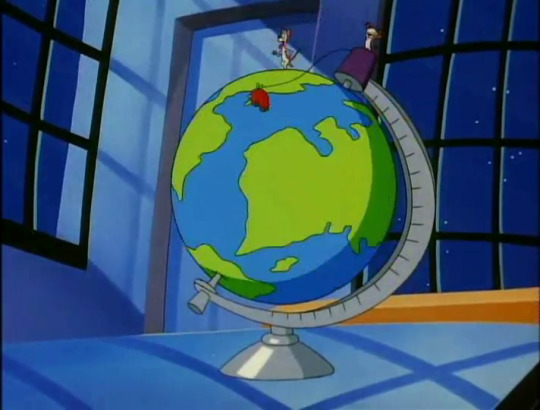
“When I build my reverse geotropic arrestor, Pinky, and throw it from the North Pole like this…”
The word “geotropic” doesn’t quite sound right. I wonder…
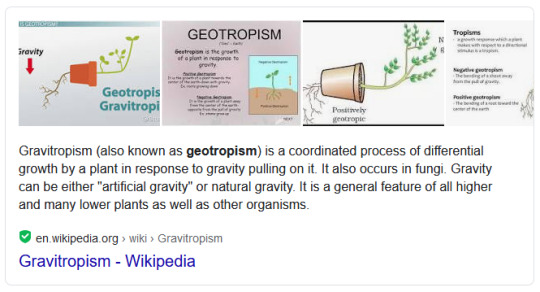
��Okay, yeah, Brain’s getting worse at naming things.
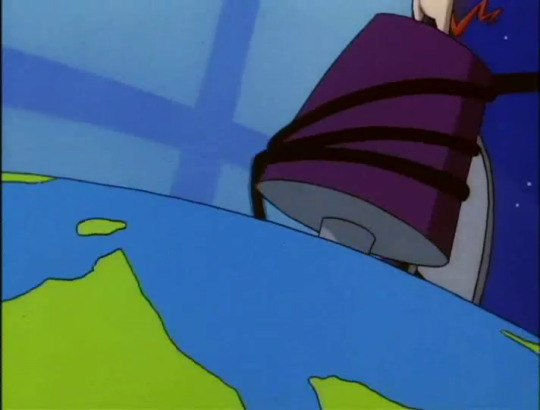
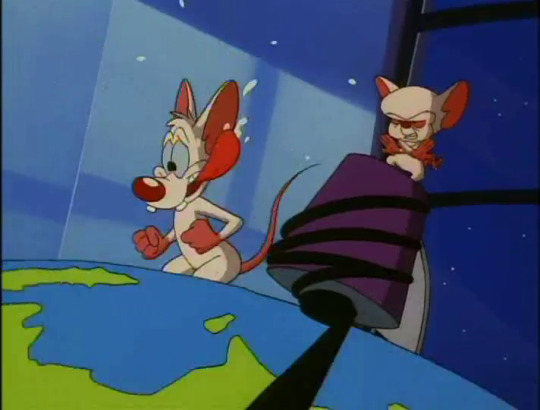
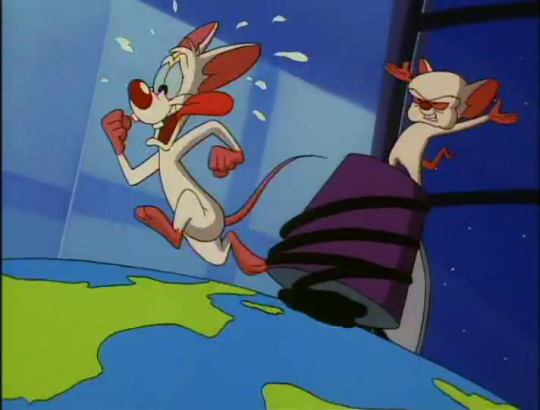
“…In a matter of seconds the cable will become taut, gravity will cease, and everyone will fly off the face of the Earth!”
Oh my GOD, Brain. This has got to be the stupidest plan you have come up with yet! Nothing about this will work.
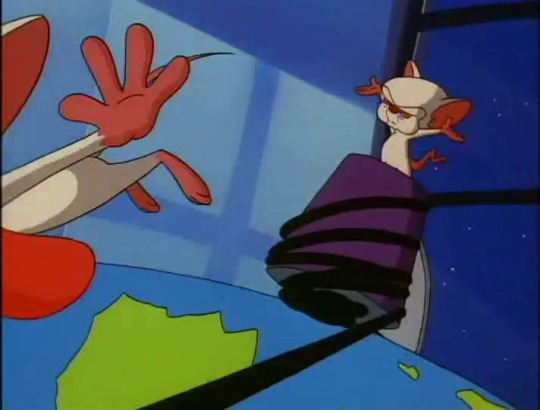
Well, there goes poor Pinky.
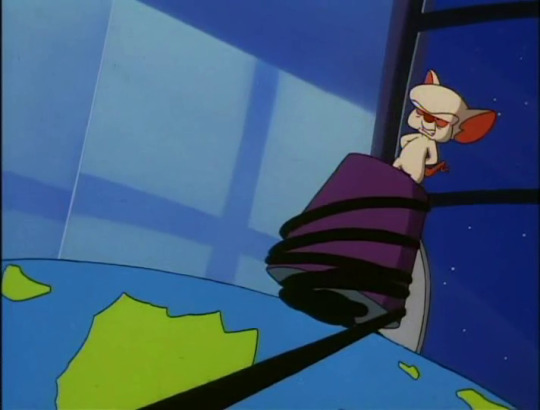
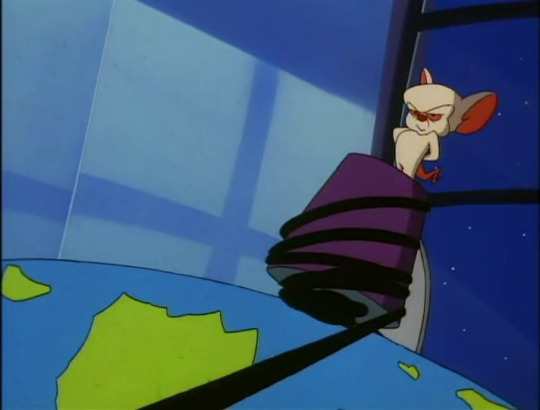
“Leaving us alone to assume control.”
It’s still “us”, huh? Noted.
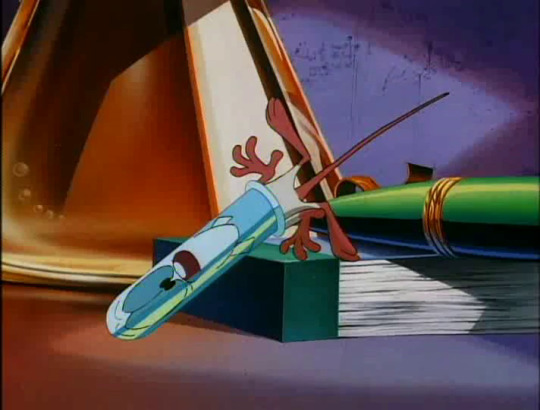
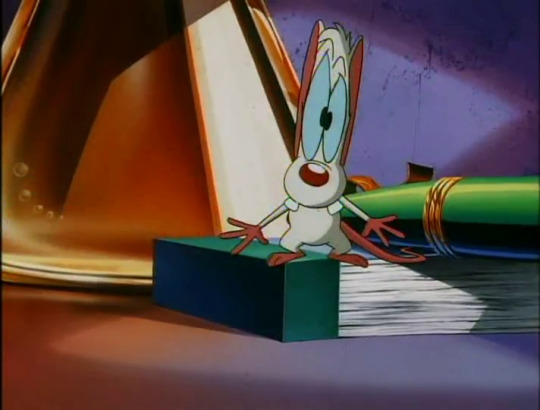
Long Pinky.
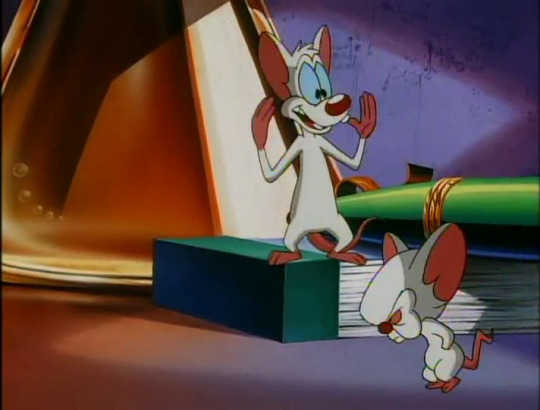
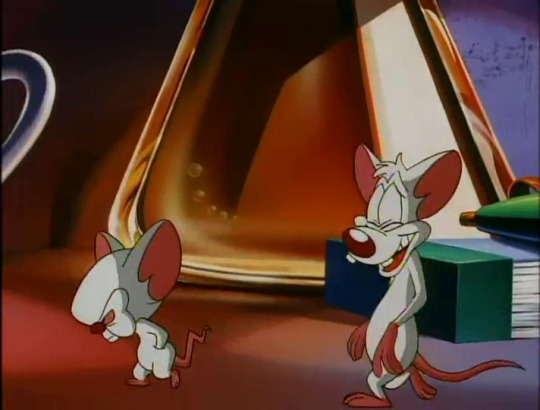
“Egad, Brain, brilliant! Haha hehe heh—!”
Pinky, sweetheart, I know praising Brain is kind of your thing but this is one time I’m going to have to call you out on your bias because this is super not brilliant and I’m actually a little worried for Brain’s mental state.
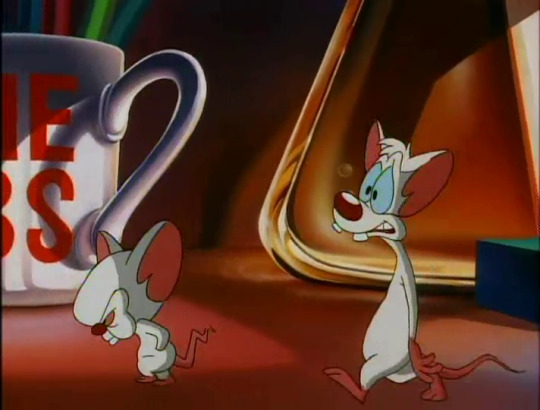
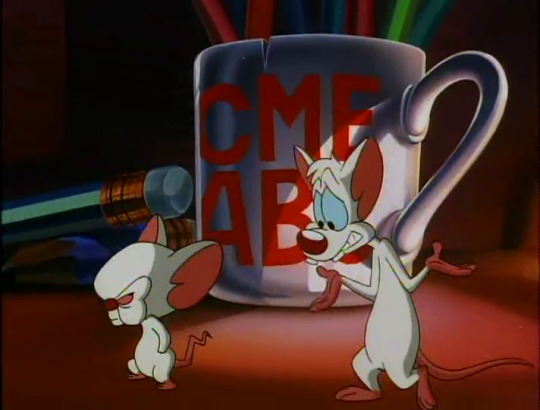
“—Oh wait, no, no. What’s going to keep us from flying off the Earth?”
That’s one flaw of many, Pinky, but I guess it’s as good a start as any.
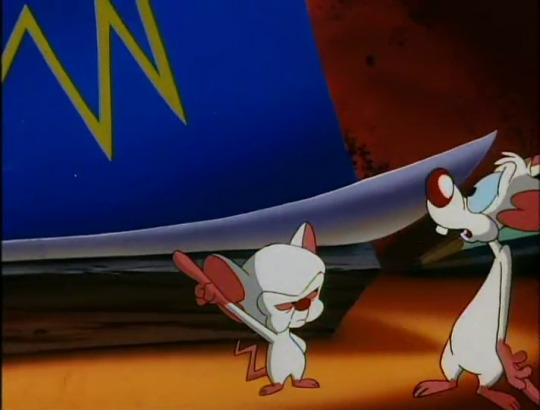
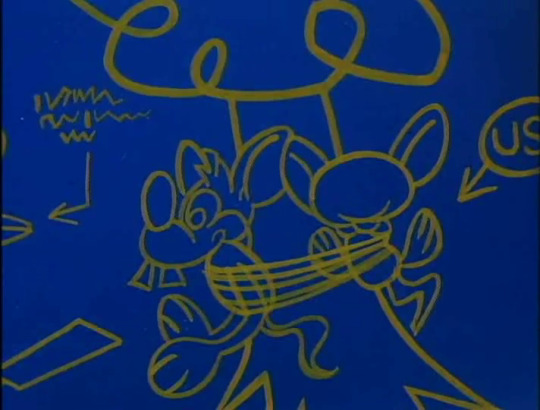
“We will duct tape ourselves to a tree.”
Because the tree will totally stay in the ground when the Earth abruptly stops spinning. Not that it will stop spinning, because none of this makes any sense.
Brain, did this idea come from, like, a dream you had or something? Is that why the plan is working on dream logic?
I know this is a comedy cartoon and this is all a joke but sometimes Brain’s plans are so fucking out-there I just have to roast him for it.
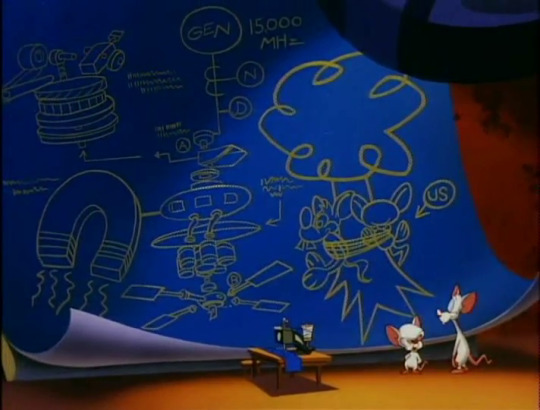
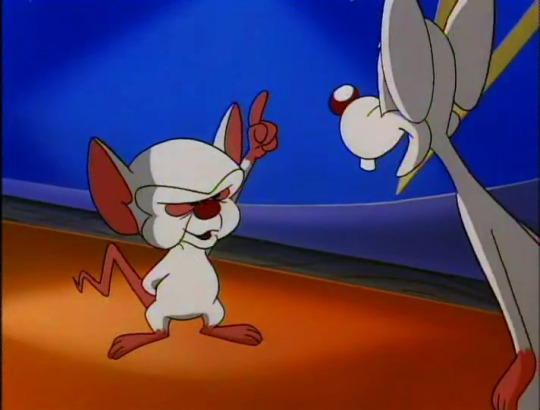
“Unfortunately we still need to raise money to buy a one billion ton magnet. But I have a solution!”
Oh boy, can’t wait to hear the solution to this one. It’s gonna be stellar if the whole plan today is anything to go by.
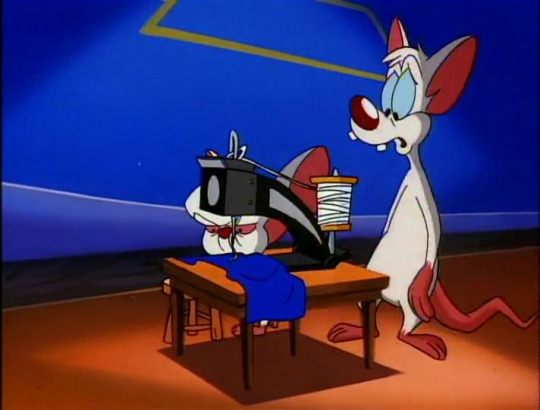
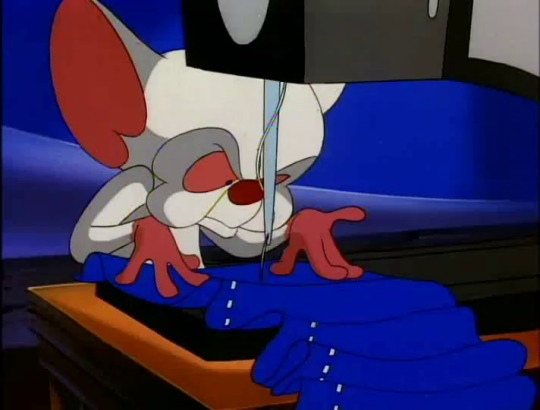
Oh nice, Brain’s the one sewing for a change! Usually this is Pinky’s area of expertise, but it’s always nice to see that Brain can do some classically domestic things too.
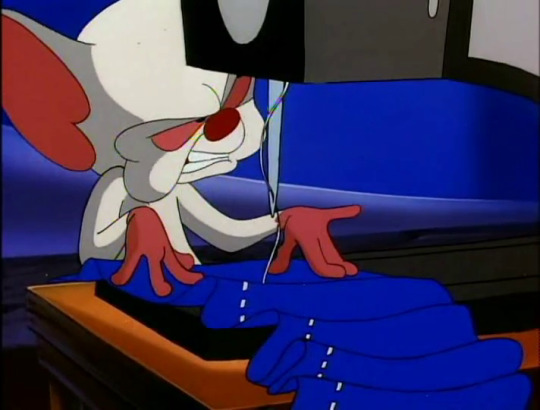
“Tomorrow is the running of the Kentucky Derby. Do you know what that is?”
Most of my knowledge on it comes from “My Brother, My Brother, and Me” goofs, so my mind keeps autocorrecting it to “Kenfucky Derby”, but go on.
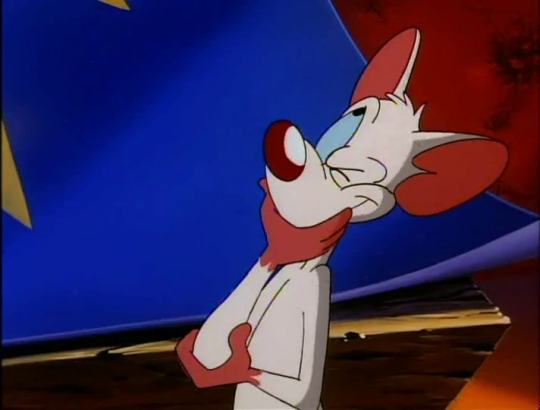
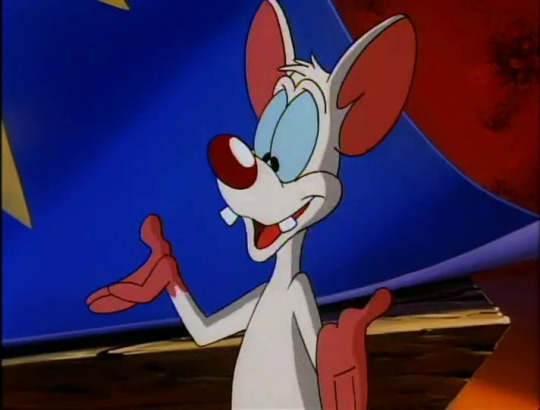
“Umm… Oh! A very large hat?”
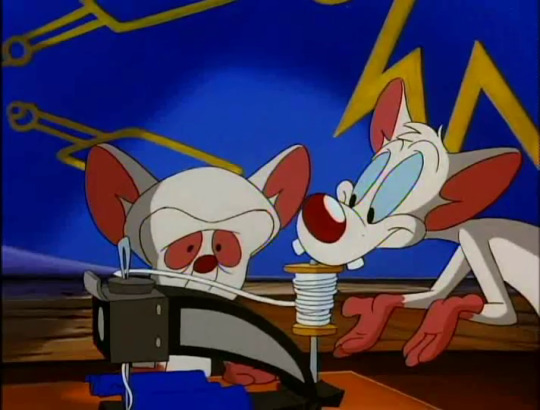
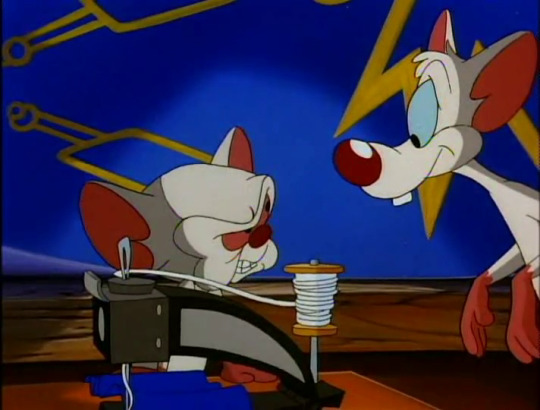
“Promise me something, Pinky. Never breed.”
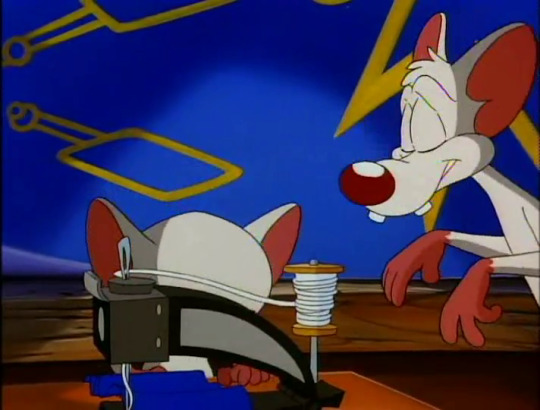
“I’ll try.”
Well, that’s going to come back to haunt them.
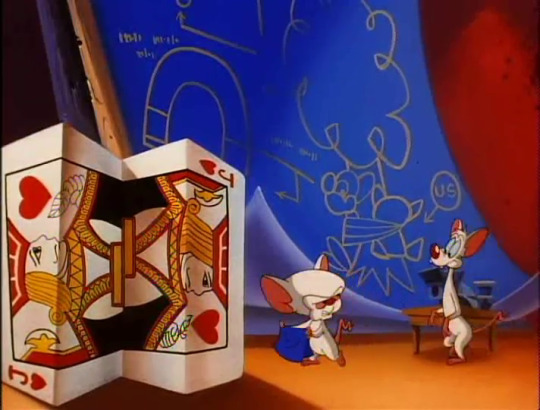
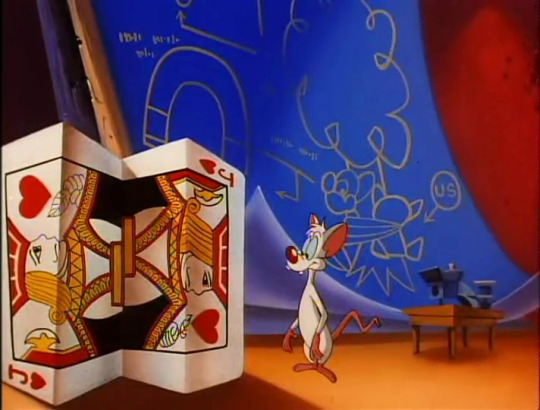
“The Kentucky Derby is the biggest horse race of the year. There’s a one million dollar purse going to the jockey riding the winning horse.”
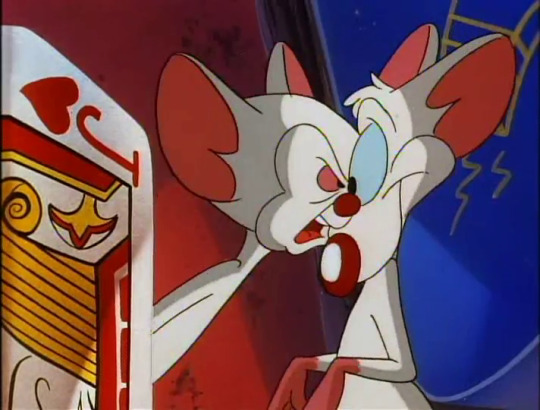
“And I am going to win that purse!”
Okay, first off: Pinky, are you just going to stand there and stare at Brain as he gets changed? Like, I understand they’re naked normally and this is the exact opposite of stripping but umm…
Secondly: Brain, did you really have to get that up close to tell Pinky this? You two are making this too easy for me.
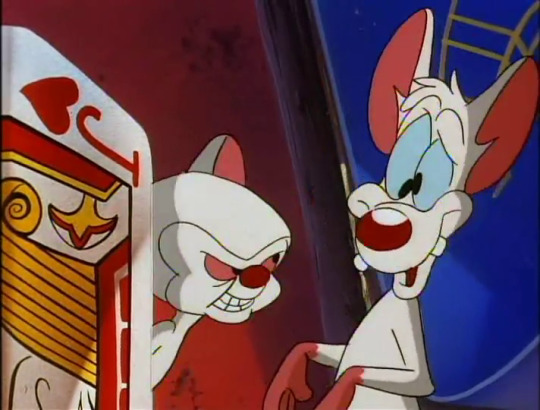
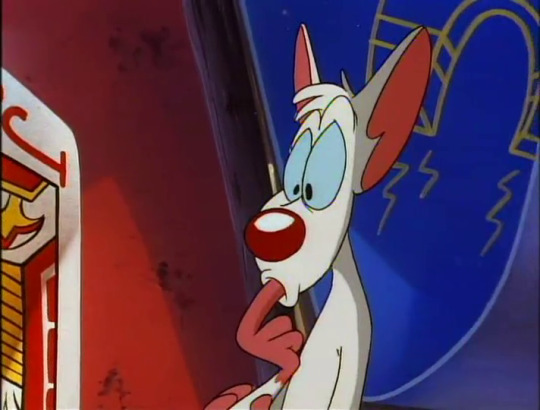
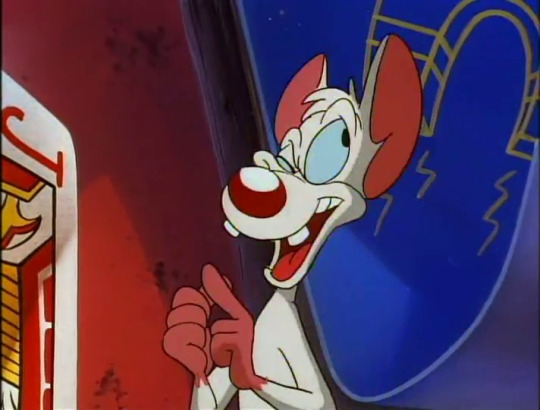
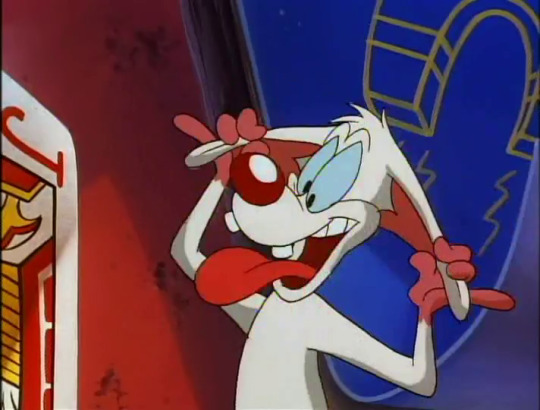
“Zort, Brain! A million dollar purse?!? Ooooh!~ You’re going to need matching pumps and earrings for that!”
Pinky’s got his priorities in order.
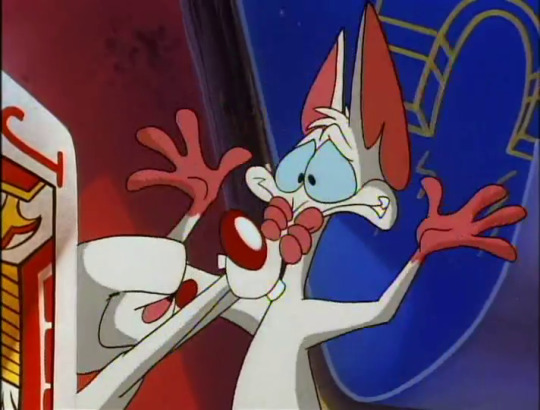
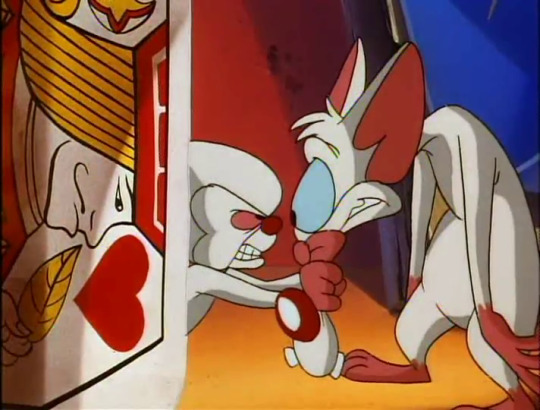
“Focus, Pinky, focus!”
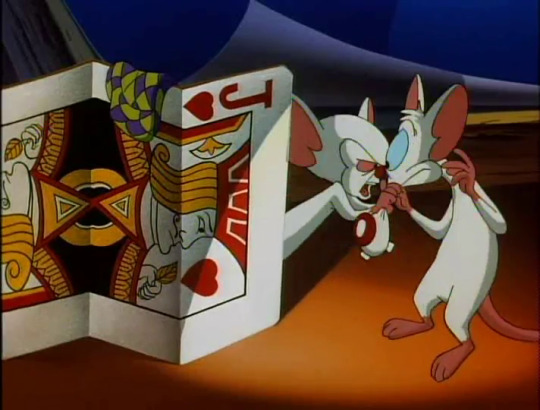
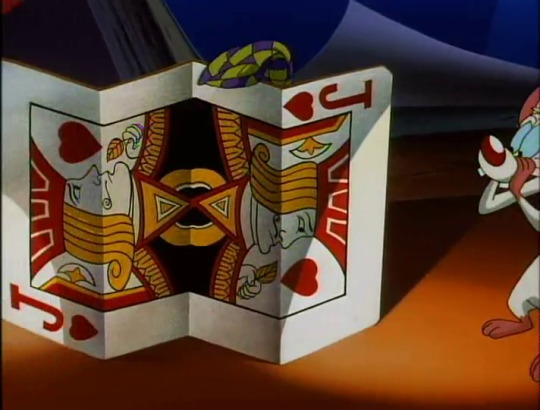
“Now watch.”
And now Brain’s ordering Pinky to watch him dress and I just…I have no words. This is all so suspect. Why do you two even need a dressing screen if you’re usually naked anyway? And it shouldn’t matter if anyone sees you get dressed unless this is some weird reverse nudity taboo you two have developed and if that’s the case, why are you allowing Pinky to watch? And if it’s for a dramatic reveal WHY ARE YOU ORDERING HIM TO WATCH YOU CHANGE???
This episode is already so goddamn wild.
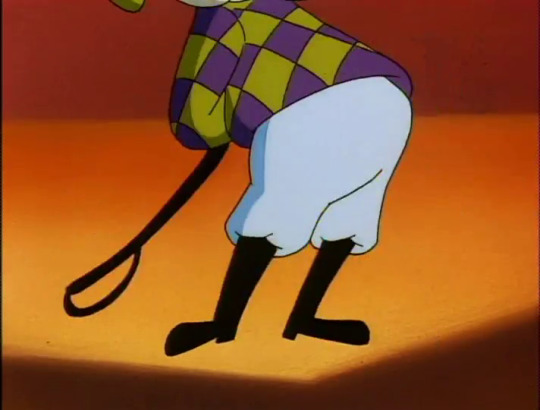
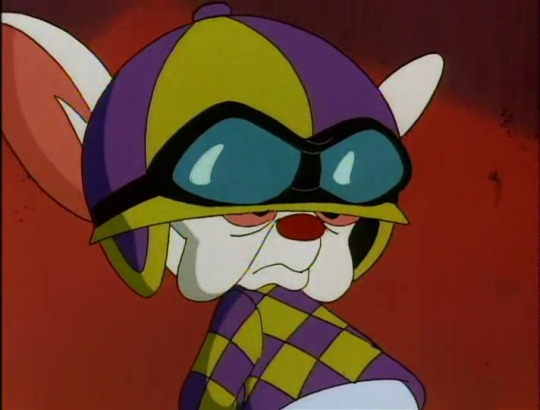
I am really not sure how I feel about that pan-up of Brain when he’s thrust his pelvis forward. At least the outfit is cute, though.
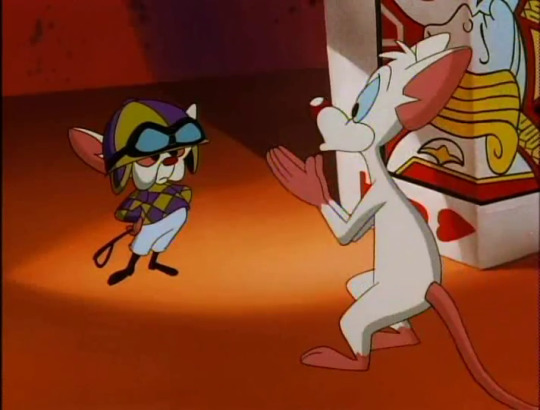
“Narf! Oh, Brain, I get it! You’re a beautiful lawn ornament!”
“Beautiful”, huh? Also noted.
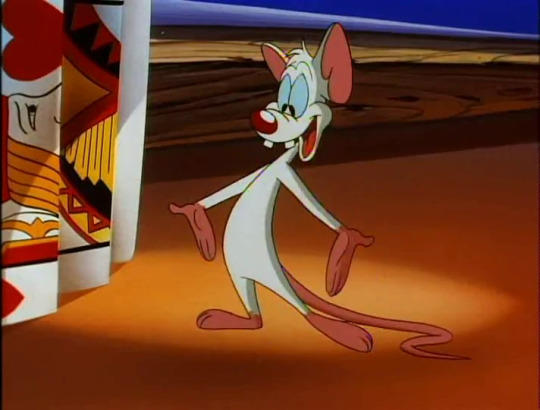
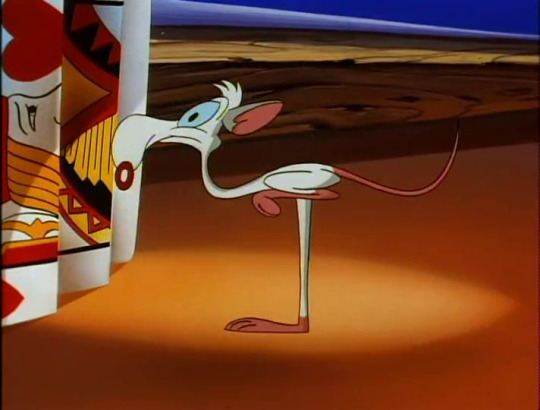
“Look at me, narf, I’m a pink flamingo! Ahahaheh!”
Oh LORD, Pinky, how are you—?!?
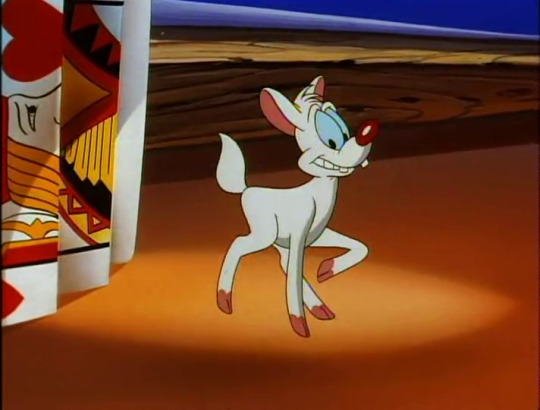
“I’m a cement deer! Ah hah!”
PINKY, STOP, YOU’RE SCARING ME! D:
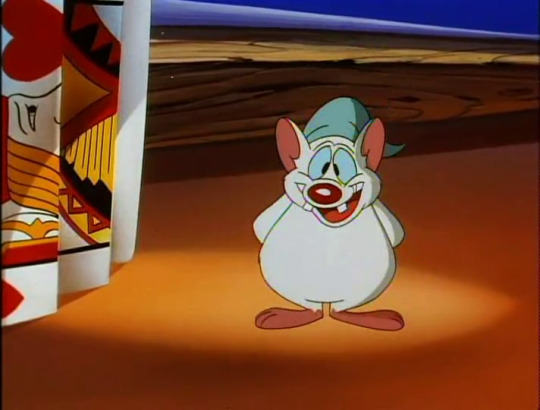
“Oh, I’m one of the seven dwarves, Brain!”
That’s more acceptable but Pinky, sweetie, warn me if you’re going to nightmarishly shapeshift again, okay?!
I guess we can add that to the list of random abilities Pinky has.
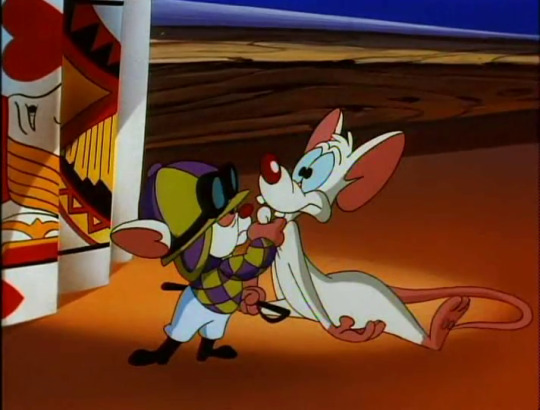
“Stop it, Pinky, or I shall have to hurt you.”
You are much calmer about this than I would be if this happened in front of me, Brain.
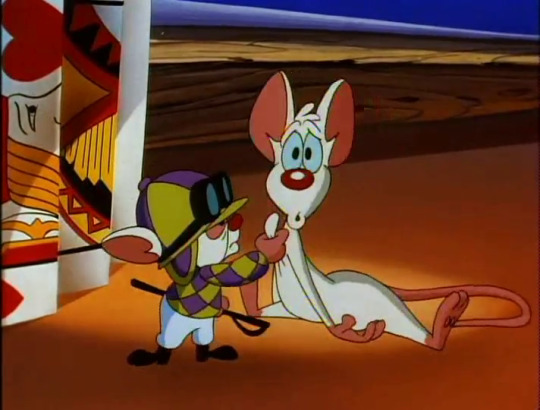
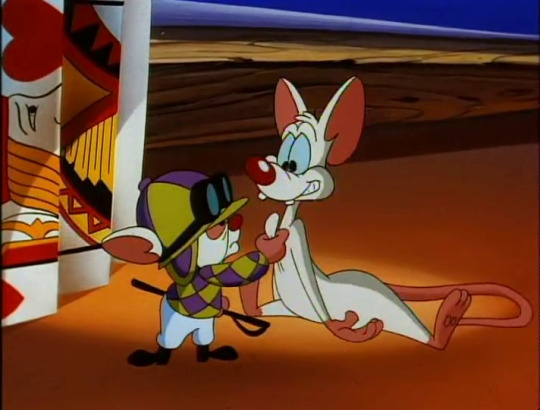
“Oh. Right-o, Brain. Narf.”
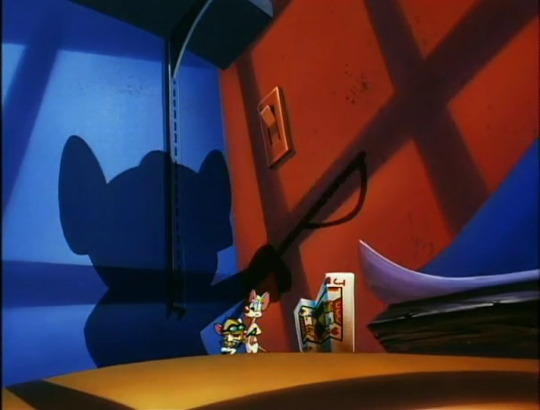
“Now let us make haste, for we have much to do before the race begins.”
“Poit.”
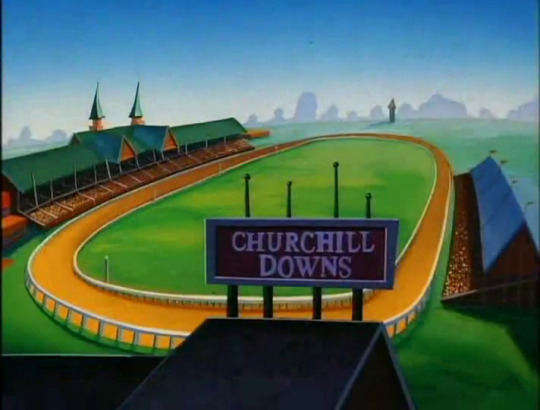
So then we cut to Churchill Downs, and I can only assume another roadtrip adventure was had off-screen.
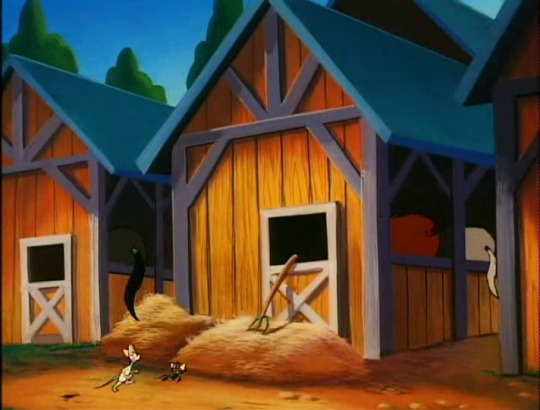
“First, Pinky, we must visit the stables.”
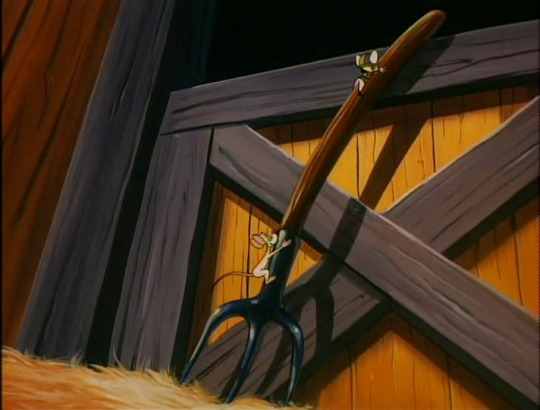
“Inside, we will find the winning horse.”
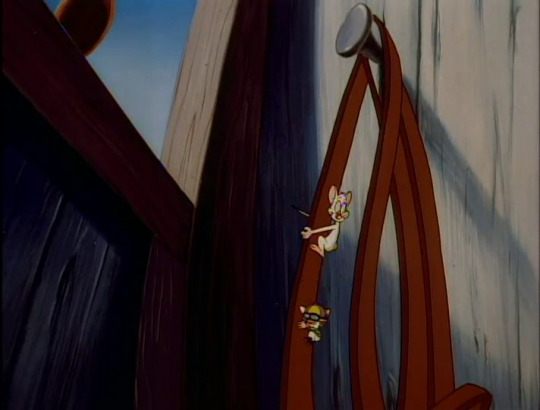
“Err… How are we gonna do that, Brain?”
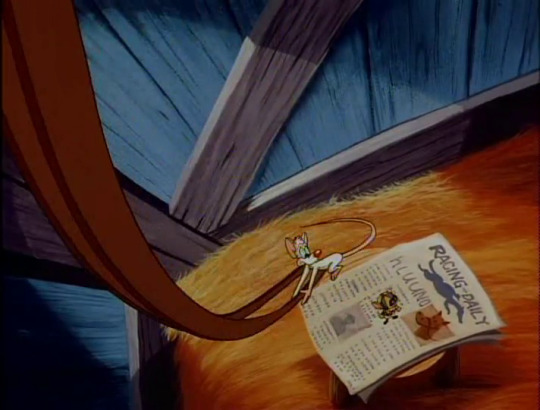
“The racing form, Pinky.”
My bet’s on... [squints] hLUUNO the horse.
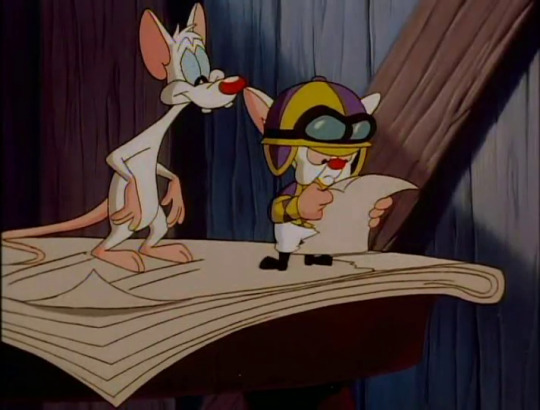
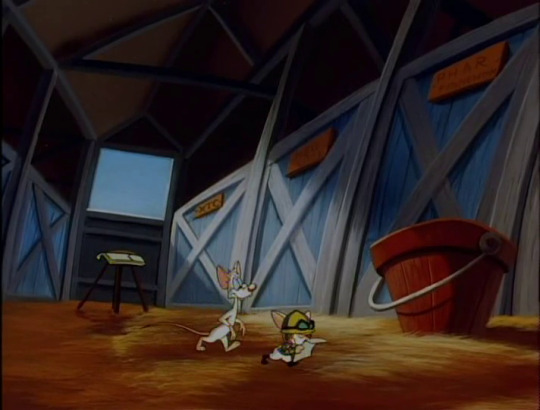
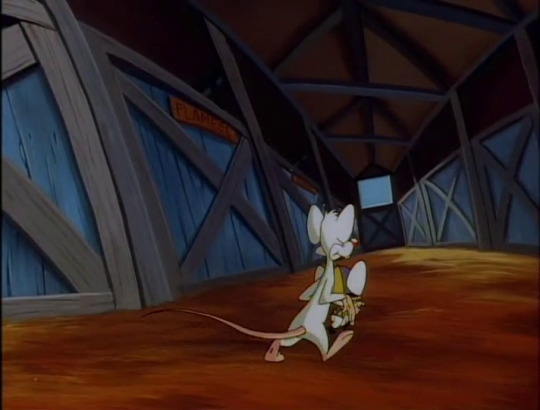
“By analysing the velocity-based pace line, mile turf win and bayer speed figures, we’ll find a grade one stakes claimer who’ll give us a key horse situation.”
“Key Horse Situation” would be a great band name. Also, whoops, little bit of an error on the name plaques, background artists.
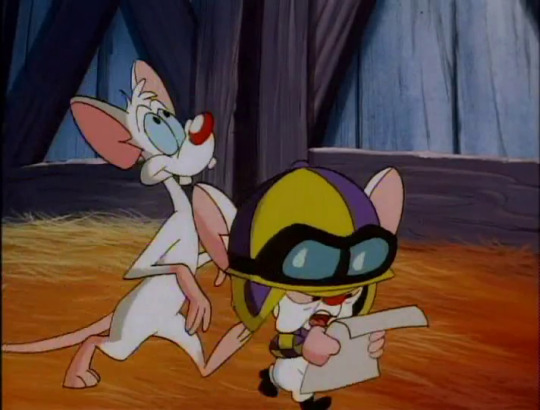
What do your mouse eyes see, Pinky?
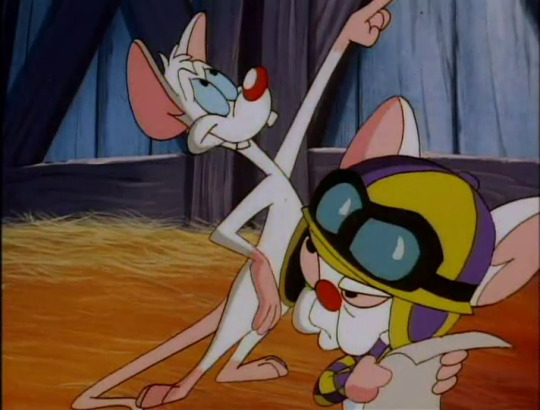
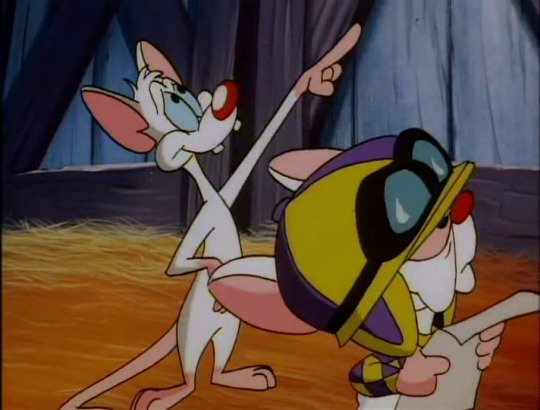
“Err, can’t we just ride the pretty one?”
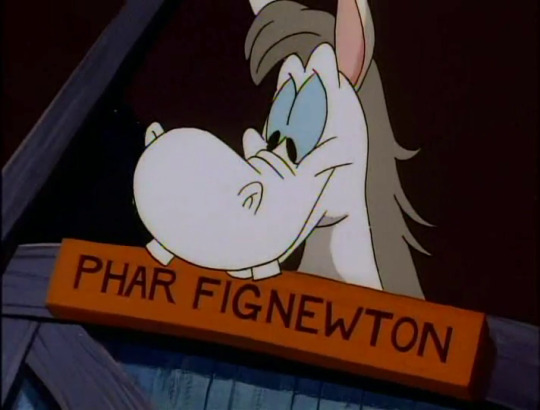
SHE!
So here she is, one of the few characters debuting in the Animaniacs run that will matter to PatB lore going forward aside from our main duo.
A fun fact for you all: Phar Fignewton’s name is a triple reference joke. “Phar Lap” was a champion thoroughbred race horse in the late 1920s and early 1930s. Fig Newtons are small pastries filled with fig paste. Lastly, “Fahrvergnügen” was a slogan for Volkswagon starting in 1990. Translated, it means “driving enjoyment”.
Phar Fignewton makes a whinnying noise and ends it off with a goofy laugh.
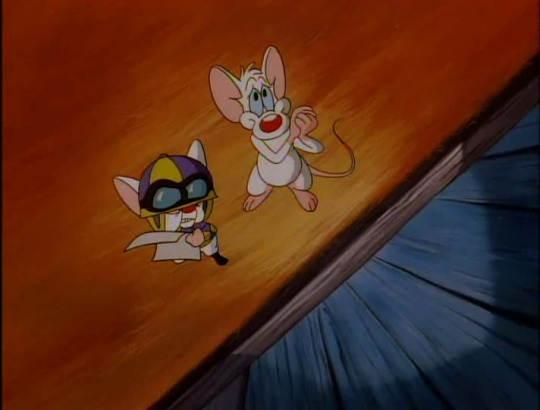
Brain is not impressed.
“Heavens, they’re multiplying…”
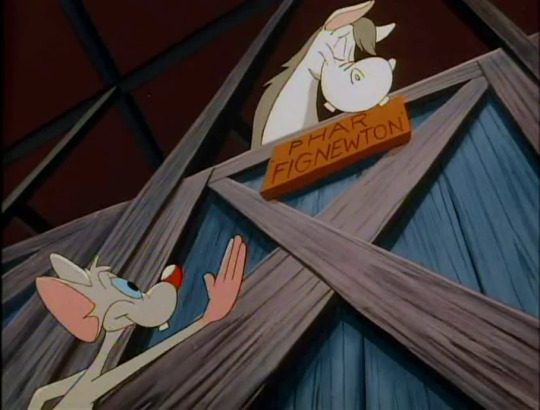
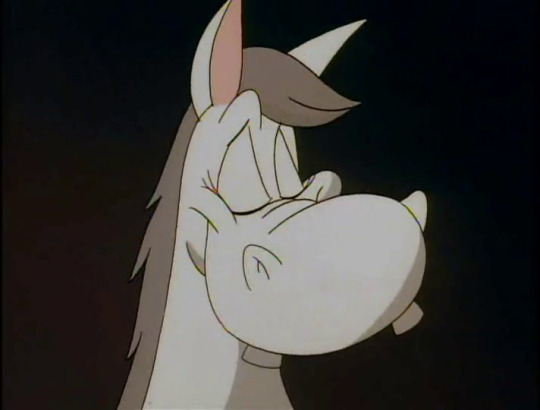
Pinky is instantly smitten with her.
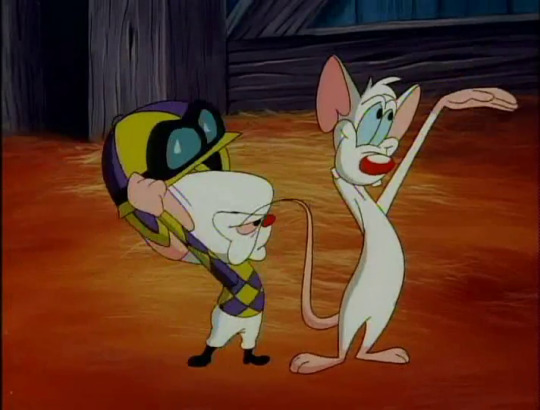
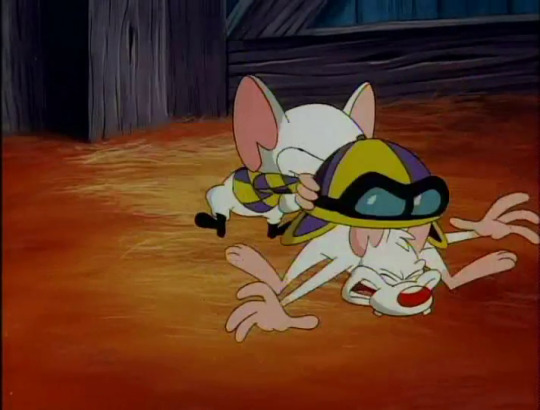
BONK!
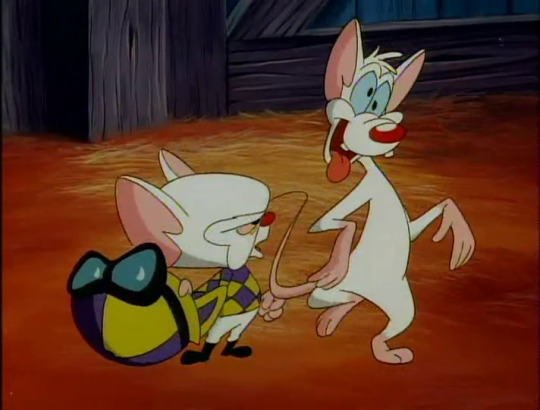
“This is a business trip, Pinky!”
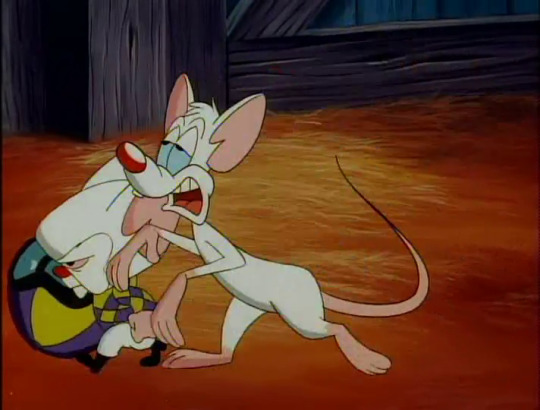
“Oh. Right. Sorry, Brain.”
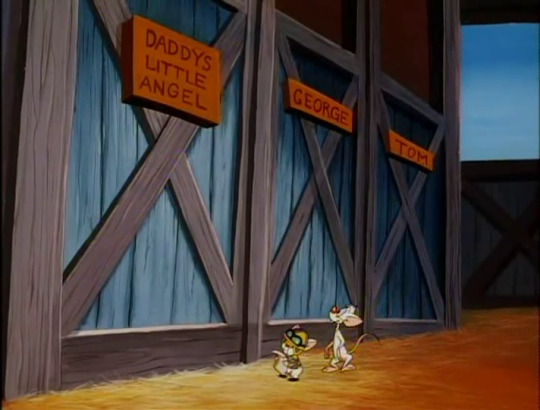
“Here is our horse.”
“’Daddy’s Little Angel’…”
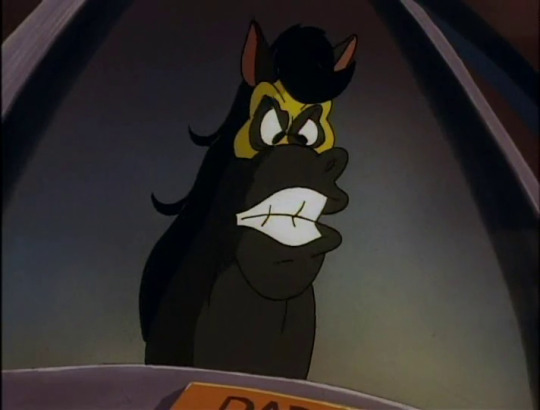
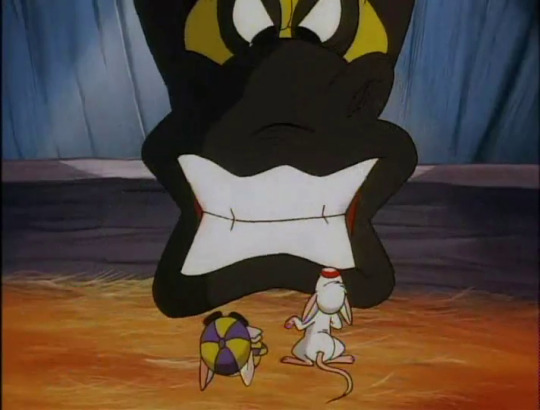
I guess it’s an ironic nickname.
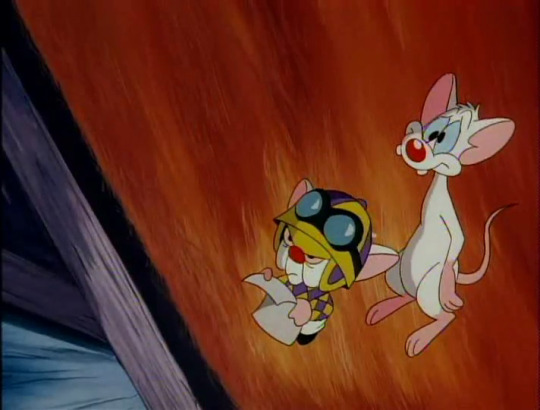
“Pinky… Are you pondering what I’m pondering?”
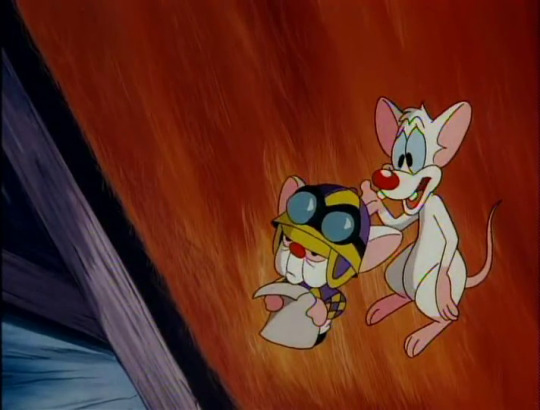
“Whu… I think so, Brain, isn’t Regis Philbin already married?”
…
Now I’m wondering if Pinky is suggesting that one of them marry Regis or if he’s suggesting that Regis marries the horse. Either way, what the fuck?
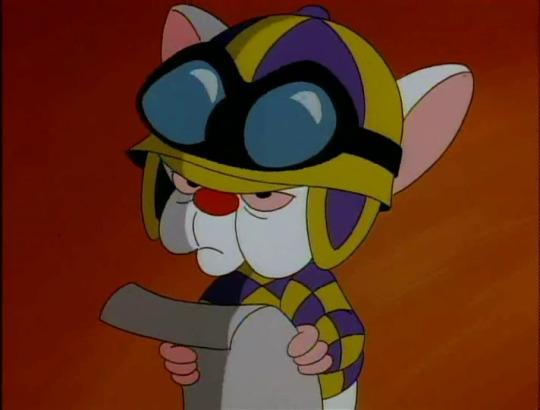
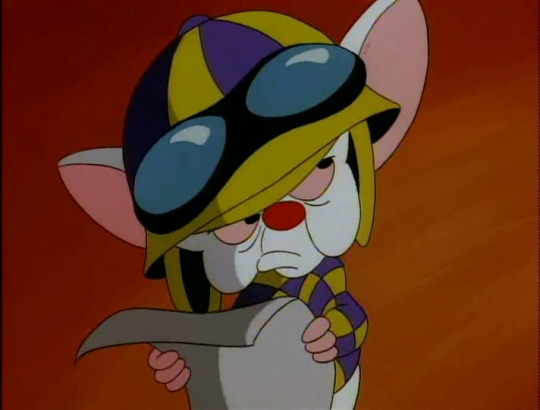
Yeah, same.
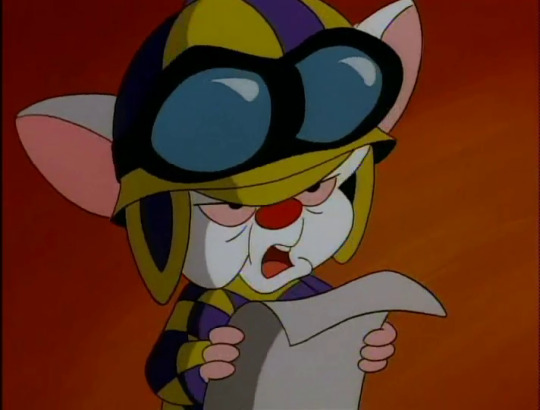
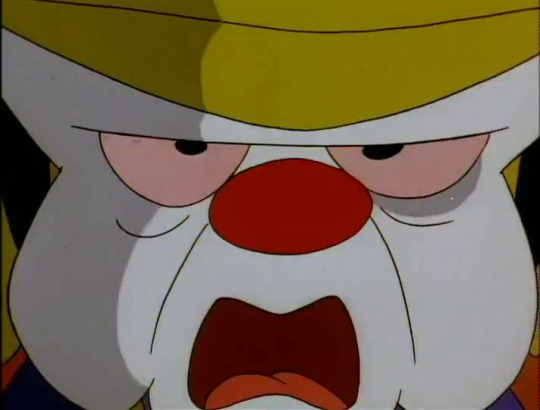
“The race, Pinky. By combining the statistics and my low body weight, this horse cannot lose! The prize money will be ours!”
GAH! Brain, I’ve had enough minor heart attacks from this episode because of Pinky’s eldritch morphing ability, I don’t need another one of your bizarre close-ups to do the same!
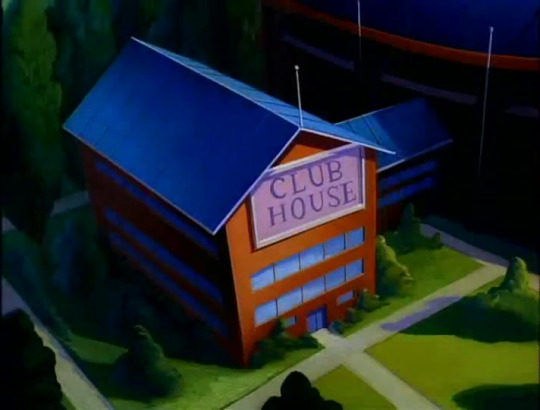
“Now I must take the place of the real jockey.”
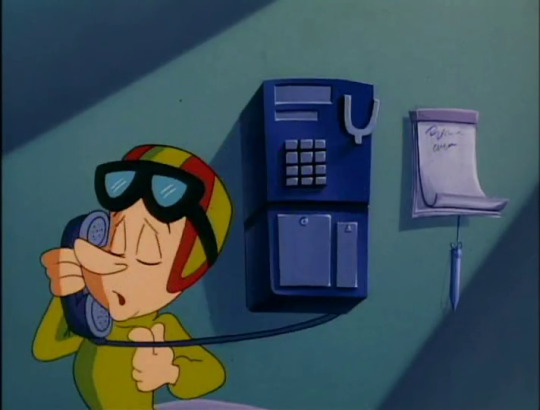
“Hello?”
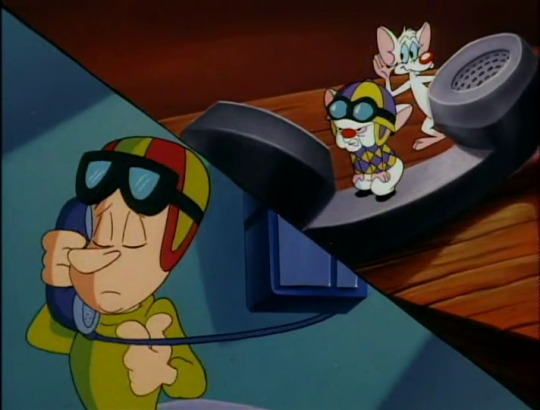
“Is this the Jockey who’s going to ride ‘Daddy’s Little Angel’?”
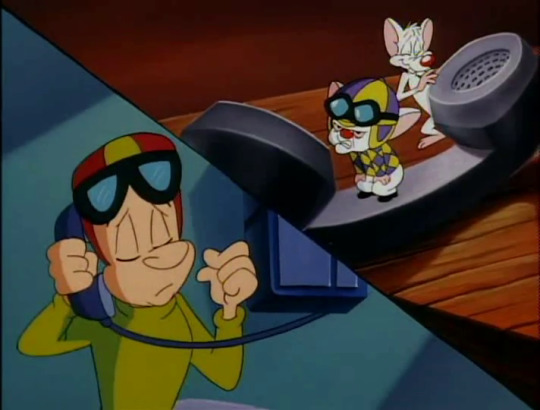
“Yeah.”
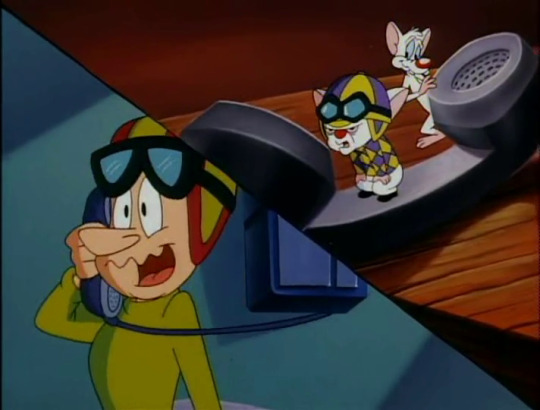
“This is Ed Mcmahon from Publisher’s Smearing House. You’ve just won ten million dollars.”
Pinky delightedly and silently listening in and chuckling in the back is precious.
And honestly, Brain, I don’t know why you’re crouching here, but it’s also cute.
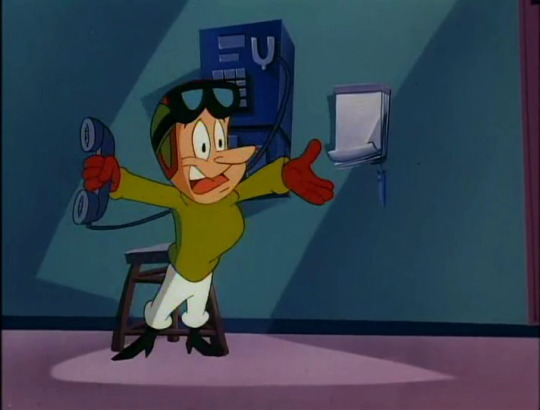
“I won ten million dollars… I WON TEN MILLION DOLLARS! I am outta here! Later!”
The mice are lucky that he’s so excited about winning all that money that he forgets to do basic things like ask when and how he’ll get the money.
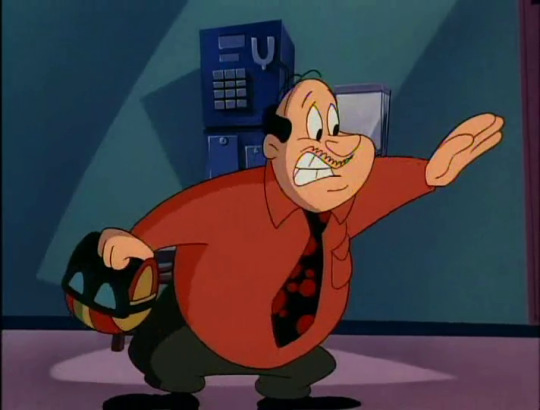
“Louie! Louie!”
“Later!”
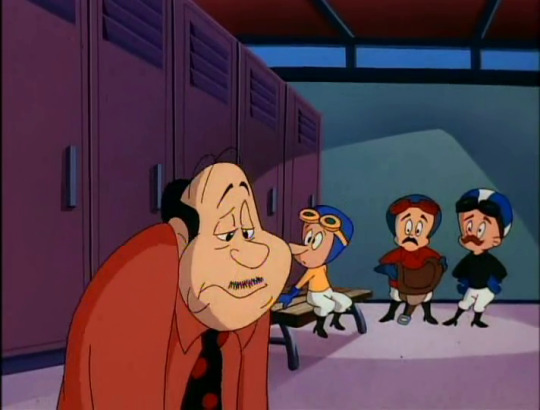
“Who’s gonna ride my horse? I mean, Louie is the smallest, lightest jockey in the entire world!”
Did you know that there’s a weight requirement for jockeys, but no height requirement?
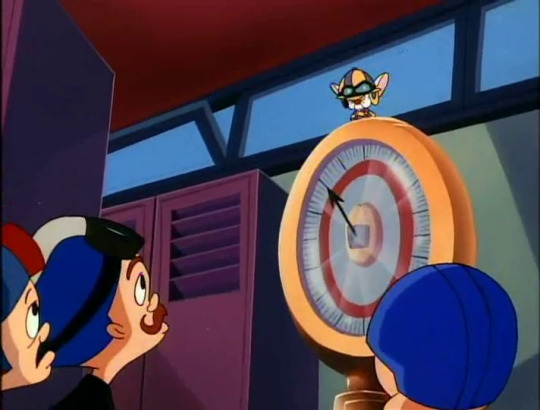
“Not anymore!”
“[GASP]”
Whoops, I just noticed another error, though it’s minor: Brain’s jockey outfit throughout this scene is light tan and purple instead of the pea green and purple that it’s supposed to be.
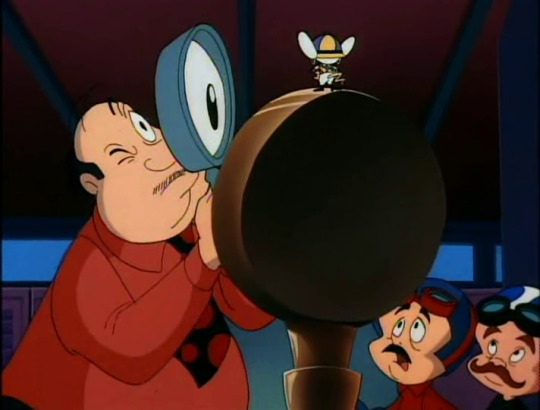
“You’re a jockey?!”
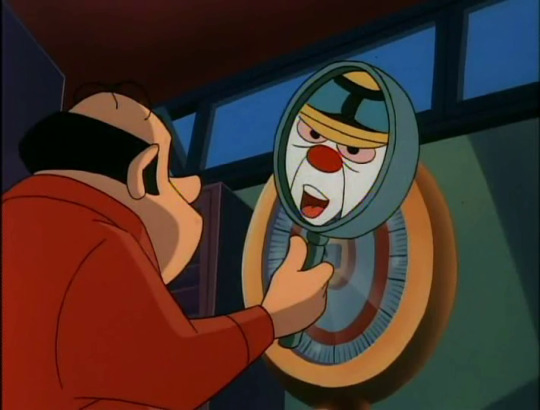
“Actually, I am a mouse in the early stages of an elaborate scheme to take over the world.”
The more this happens, the more I’m starting to think that Brain does this shtick on purpose to emotionally and mentally disarm people who would otherwise suspect that he’s not human. The fact that it works shows you just how idiotic the human beings of this world are.
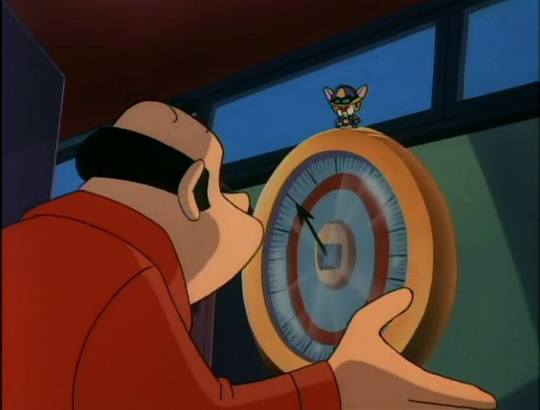
“Well, fine, we all need a hobby but…will you ride my horse?”
Oh, sir, I think it’s much more than a hobby at this point. If only you knew…
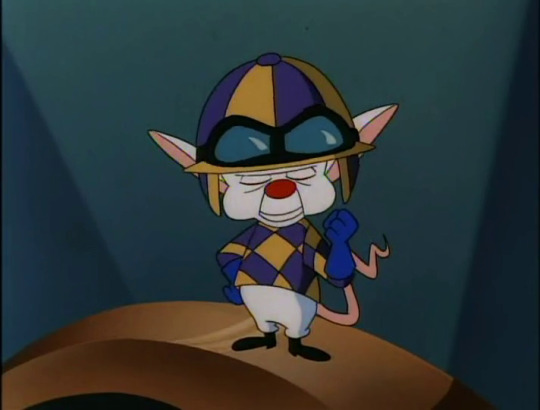
“I shall ride! And win!”
His design is a little odd here, but it’s still a good pose.
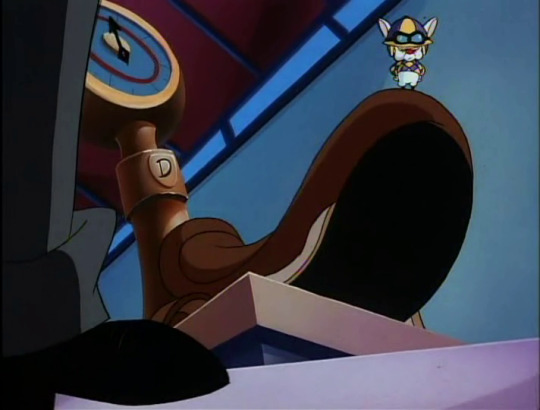
So Brain next has to be weighed to make sure he meets the requirements.
“Saddle: Seven pounds. Saddle and rider: Seven pounds 3 ounces.”
So if you can recall from the previous rewatch post, a house mouse on average weighs 19g, and a common wood mouse weighs 23g (it can be up for debate which type of mouse Brain is). Converting Brain’s 3 ounces of weight to grams would result in him weighing 85.0486g.
Brain does have a bit of a cute little potbelly thing going on, but he’s also consistently much smaller in height and width than the average adult mouse in the series. I think the incredible difference in weight is mostly coming from the heft of Brain’s, well, brain and skull…and the muscle mass packed into that tiny body to help keep him upright.
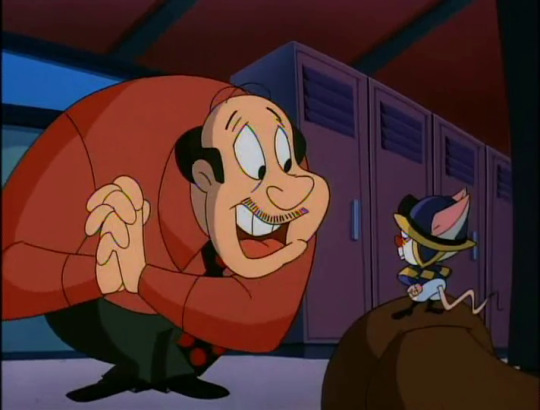
“A genetically perfect jockey! This is fantastic!”
Please don’t phrase it like that.
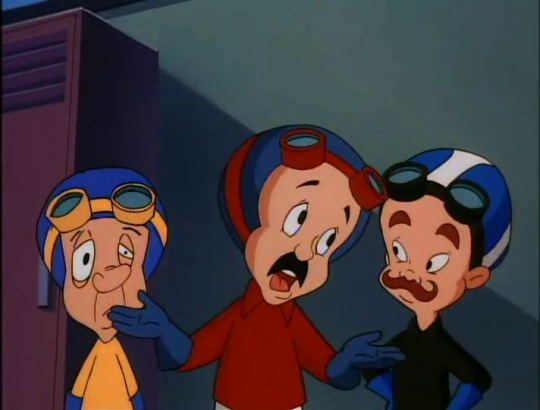
“…Let’s look into early retirement.”
That jockey on the left is going through some shit, man. He looks like how I feel after working an eight hour shift on the holidays.
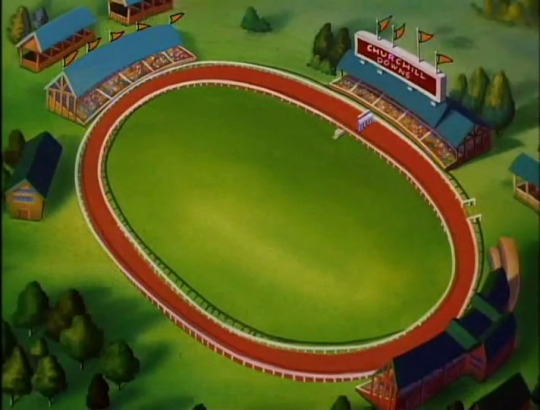
And so we skip to the beginning of the race!
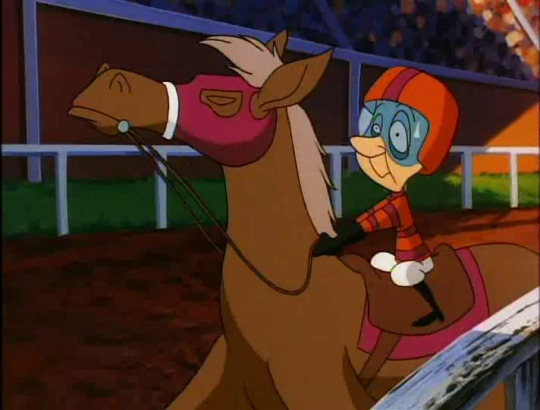
That poor, poor jockey…who changed colour schemes for some reason.
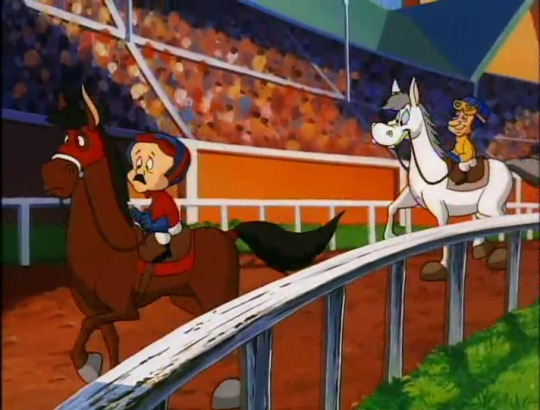
There’s Phar Fignewton with a jockey who honestly looks like he’s high.
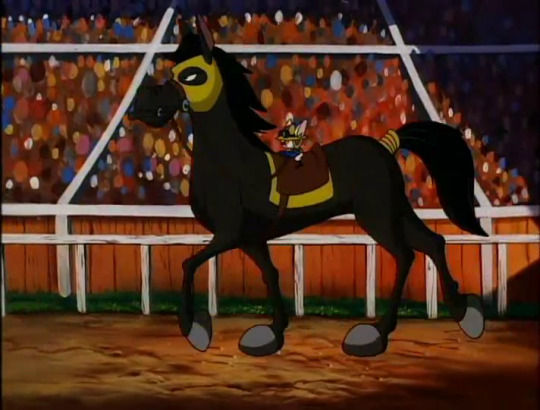
And here’s our little mousey fella, who has somehow managed to make this aggressive horse obedient.
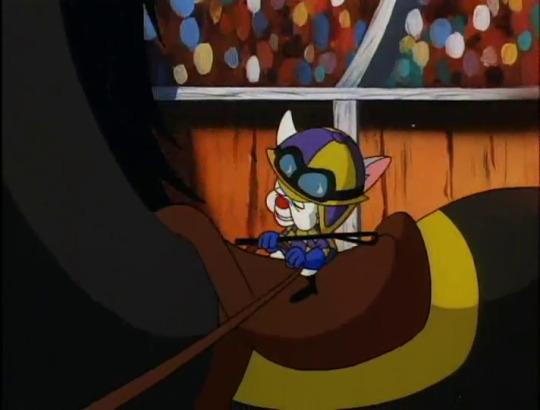
“Camptown race is five miles long, do-dah, do-dah.~”
He’s so happy he’s singing to himself! This is honestly so precious that I completely forgive him for not getting the lyrics correct.
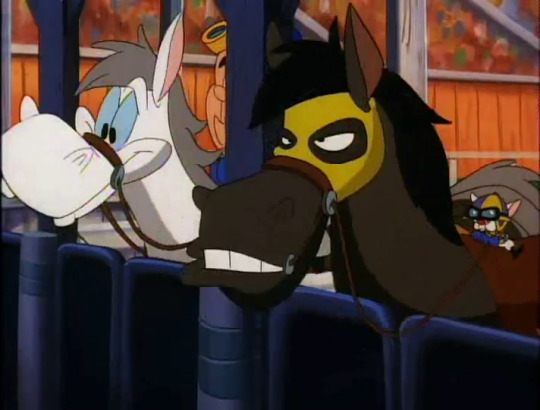
Coincidentally, Daddy’s Little Angel is positioned next to Phar Fignewton.
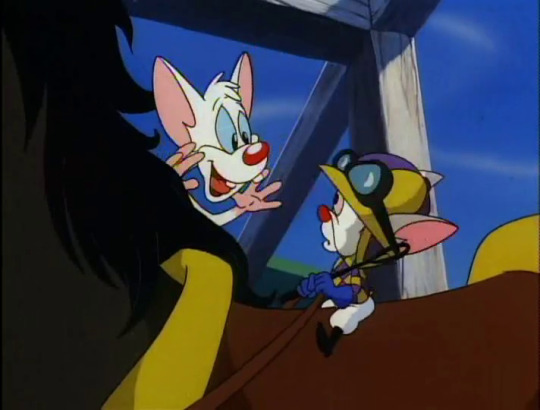
“Ooh, isn’t this exciting, Brain?”
Uh oh.
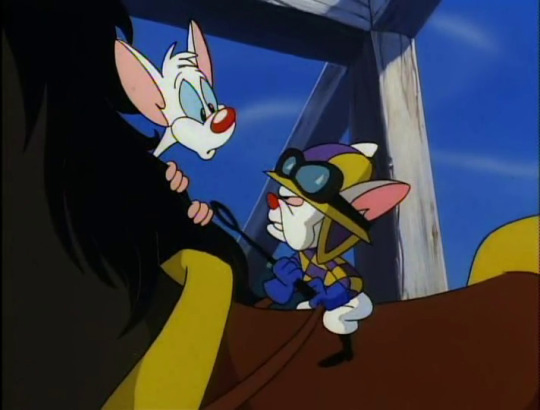
“Pinky, what are you doing here? Your weight will disrupt my winning calculations!”
I don’t know if it’d be that off, Brain. The combined weight of two mice is still much less than that of a human jockey.
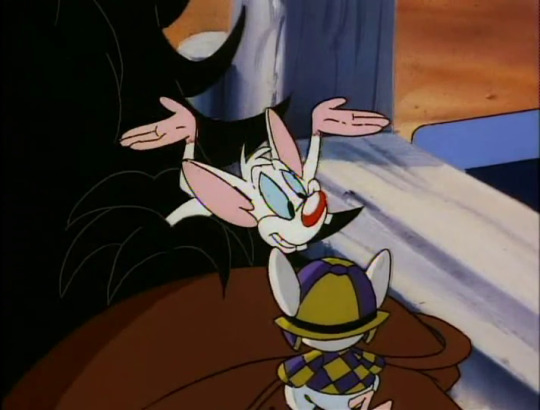
“But Brain, it’s too exciting! I—“
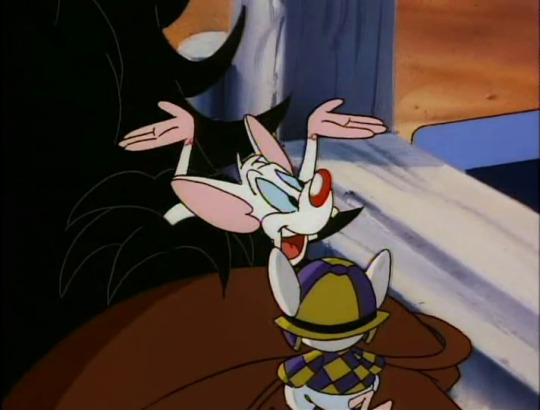
[TARGET LOCKED]
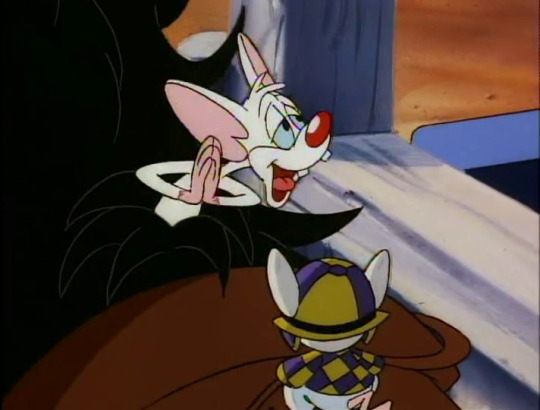
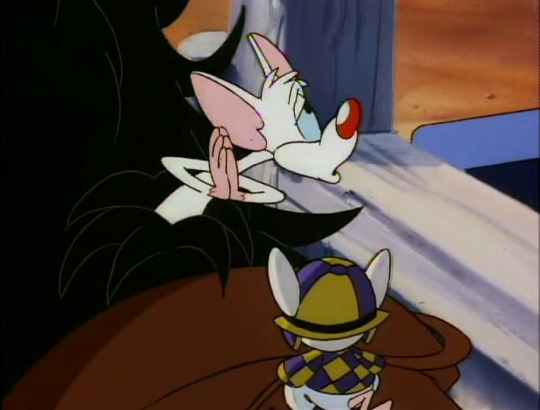
“Oooh! Heh. Hello.~”
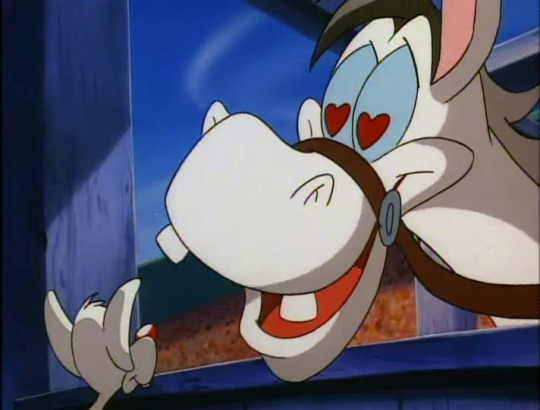
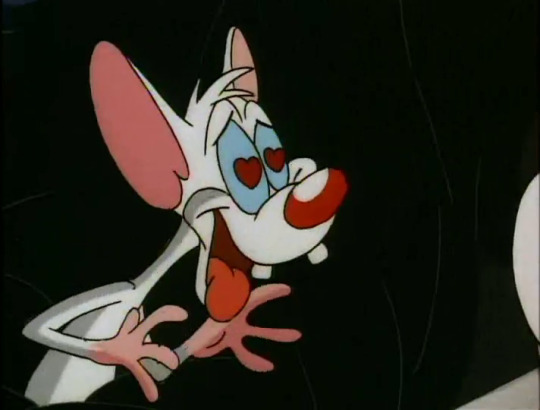
I think I’m going to save my thoughts on this whole…thing until the end. Right now I will say, however, that I wasn’t quite expecting the tongue-hanging-out-of-gaping-mouth lovestruck/horny??? reaction.
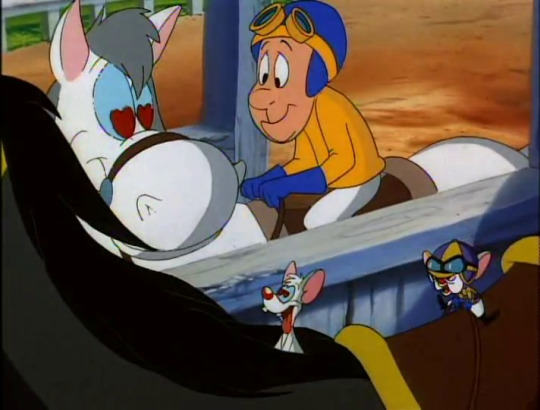
“Pinky, the race is starting!”
Too late, Brain.
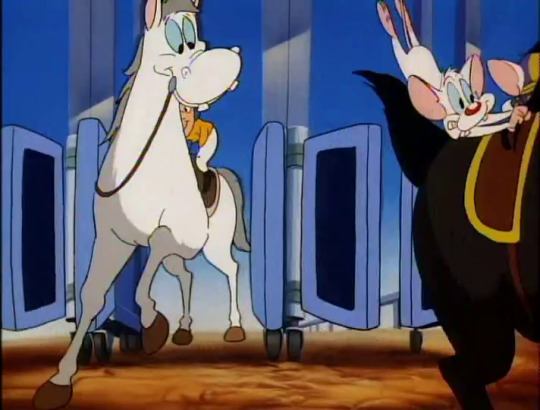
And we’re off!
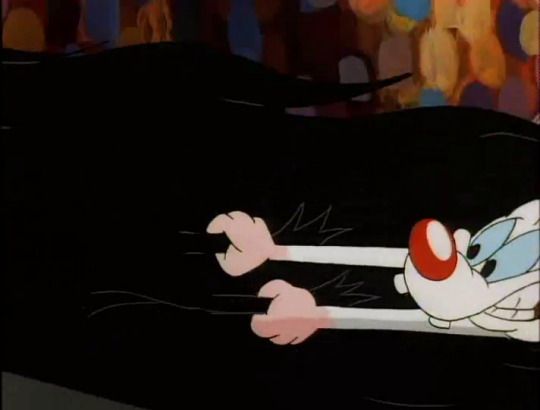
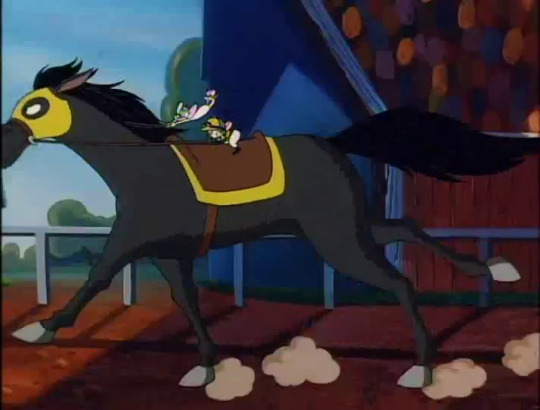
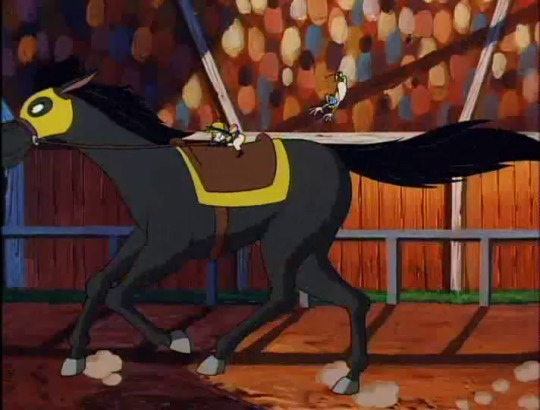
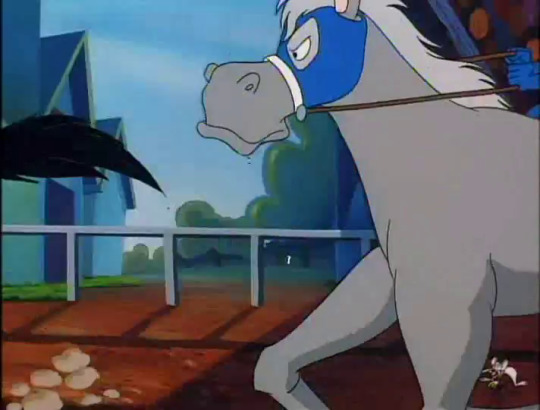
Bye, Pinky.
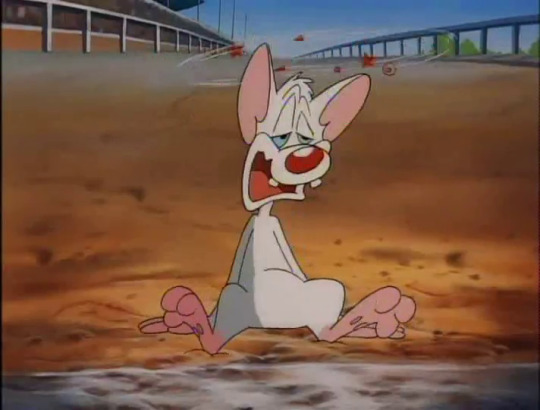
“There’s baloney in our slacks…~”
Pfft.
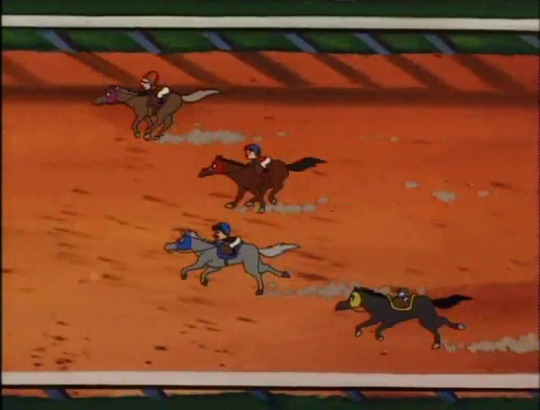
So as the race goes on, we get to know a few more of the horses’ names: Isle of Yap (a nice callback to the first PatB short), Flamiel (which is apparently the WB writers’ favourite word?), and Leggo-my-Egoiste (a double reference to an old Eggo slogan and the name of a cologne).
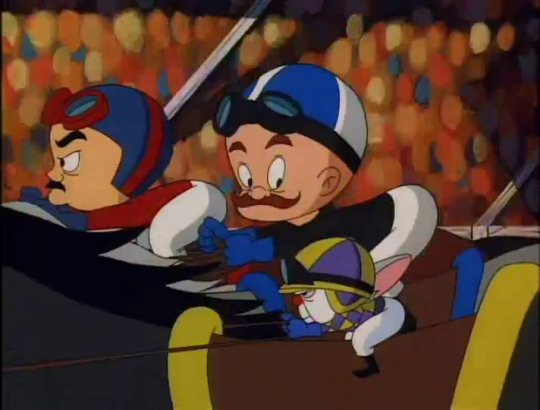
The other jockeys are more than a little surprised by Brain and his steed taking the lead early in the race.
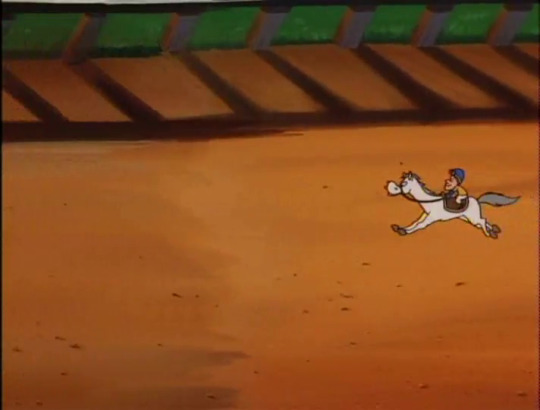
Phar Fignewton is trailing way behind.
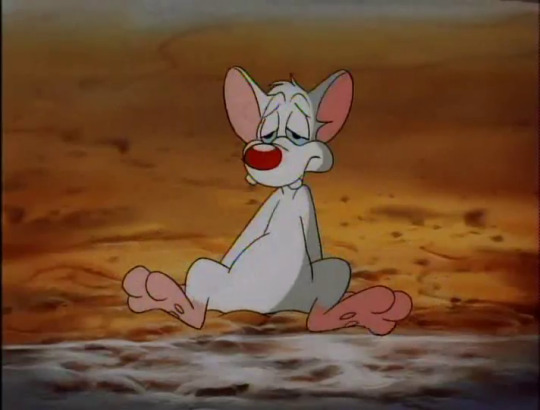
Meanwhile, Pinky’s woken up from fainting, seeing the oncoming horses—
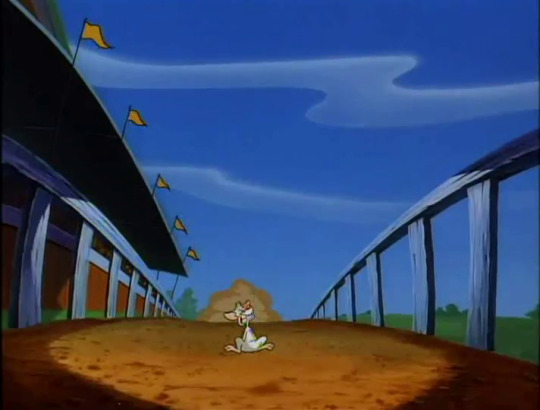
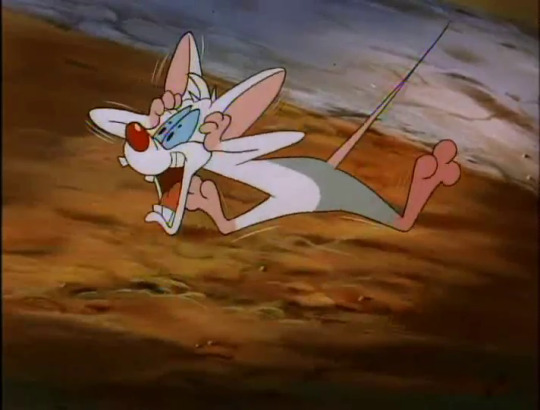
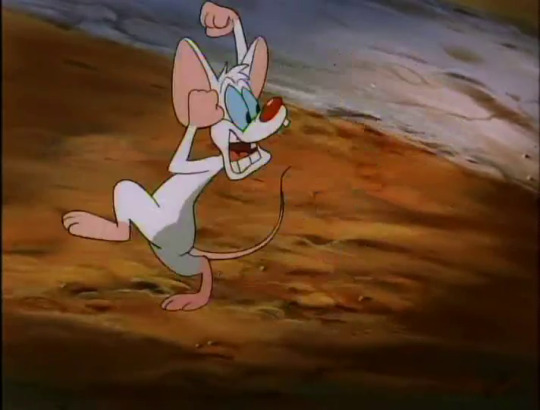
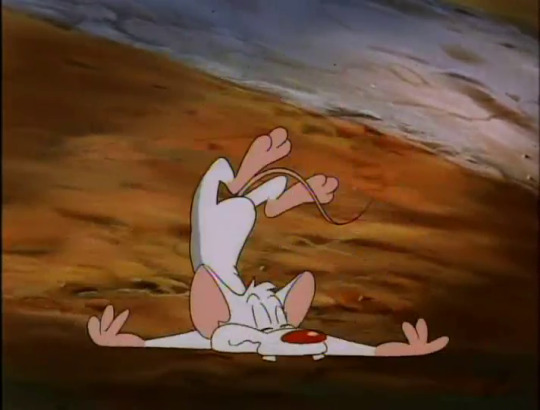
--and promptly freaks out and stumbles back down again.
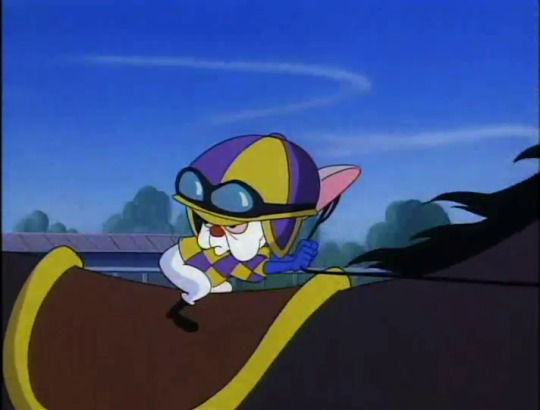
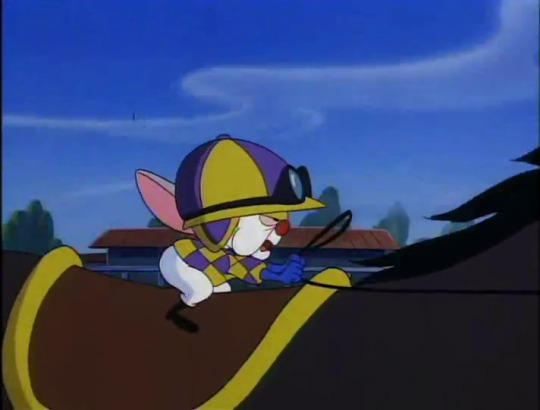
“Victory, she waits for me! Oh, the do-dah-day!”
You really have to stop tempting fate like this, Brain.
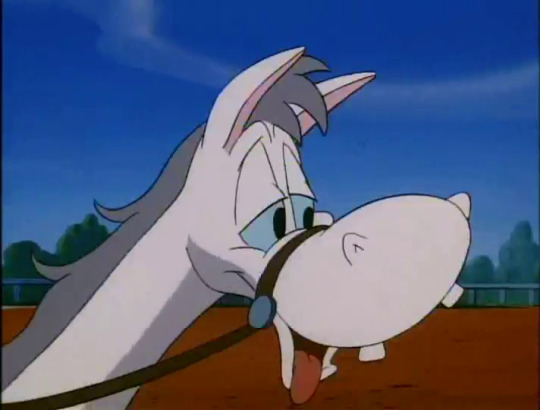
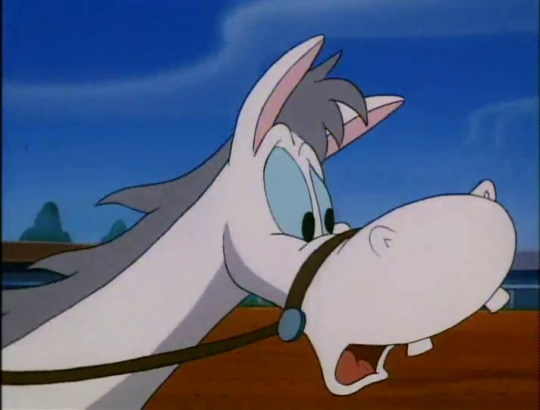
Phar Fignewton’s very tired, but what’s this?
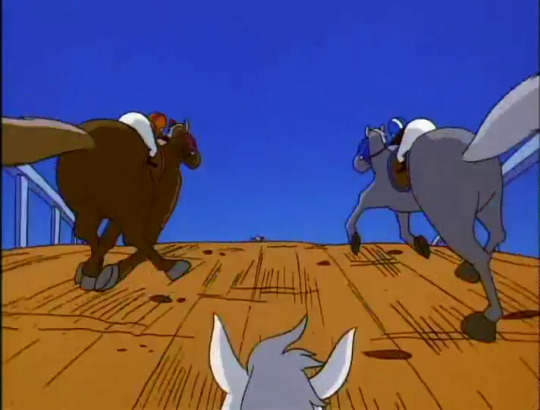
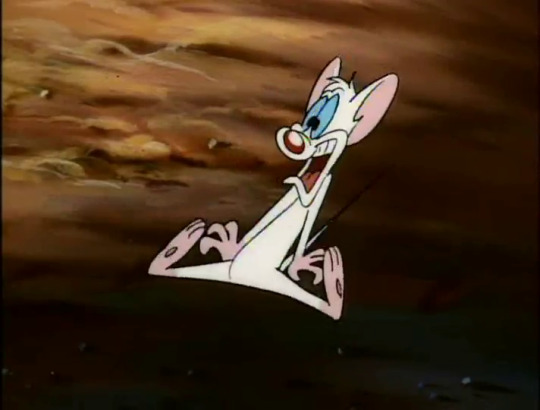
Is that…Pinky in harm’s way?
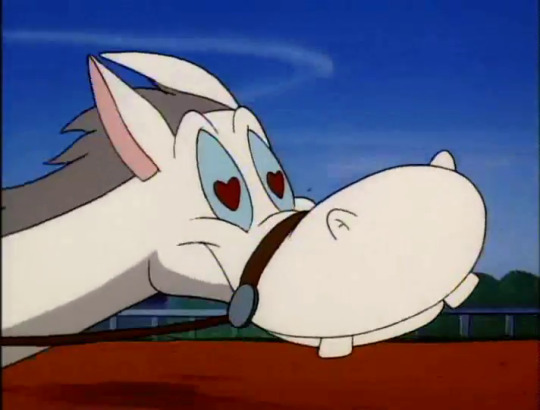
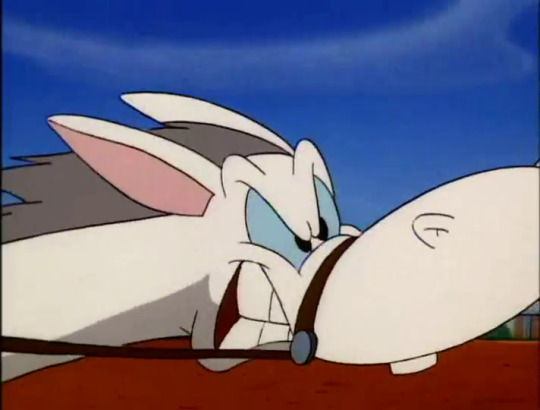
ThePowerOfLove.mp3
Determined and fueled by her inexplicable crush, Phar Fignewton starts gaining ground on the other horses.
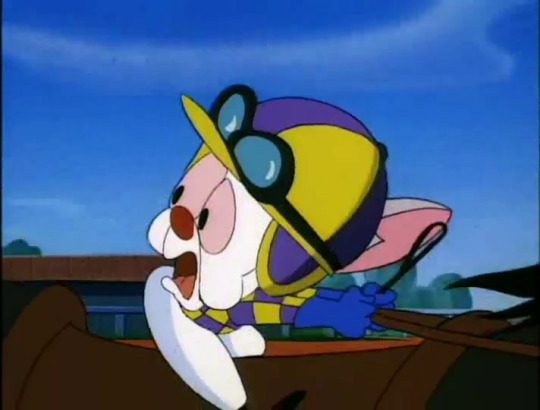
Brain didn’t calculate for this!
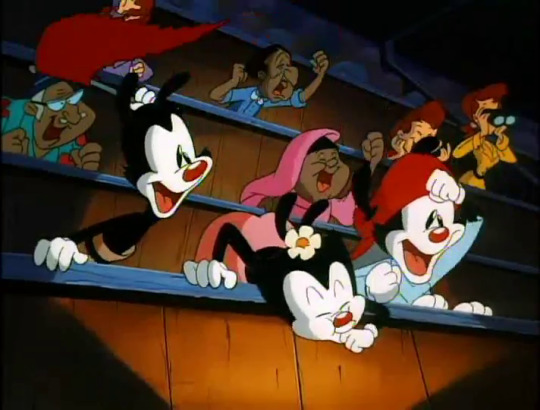
…Oh! Hi, Warners! Looks like they’re cheering Phar on.
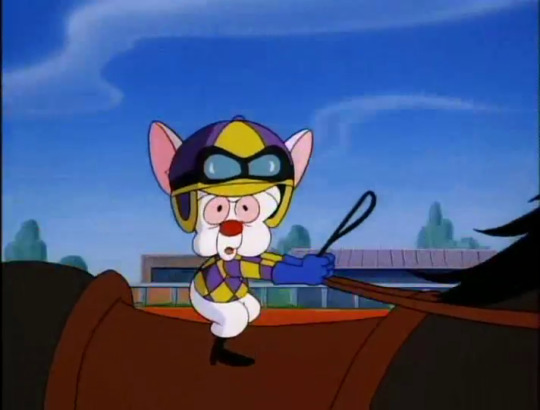
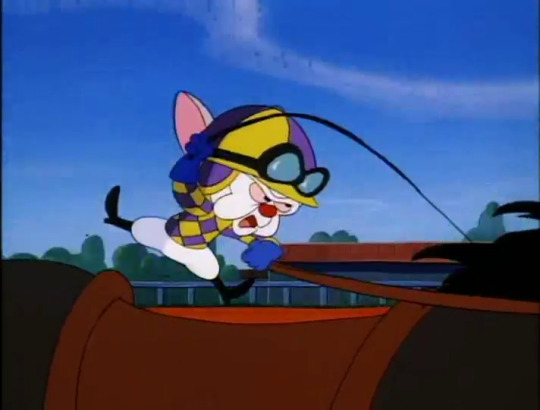
“Oh no! Yah! Yah! Yah!”
I didn’t think whips were allowed in races like the Kentucky Derby, but apparently they are. Their use was only restricted—not banned—in the summer of 2020, which is alarming to say the least.
On a different note, I know some of you folks are now jotting down the fact that Brain knows how to use a whip. I see you.
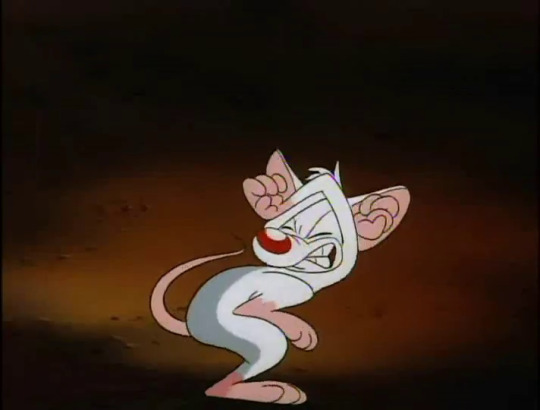
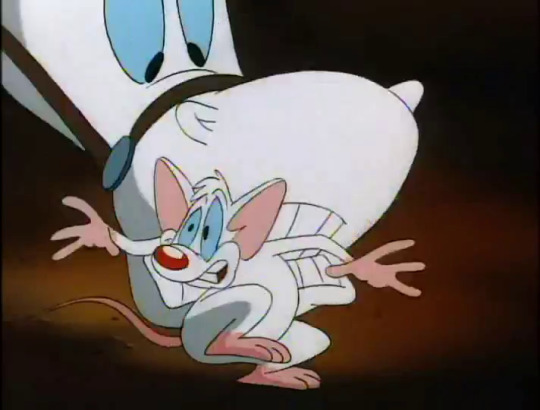
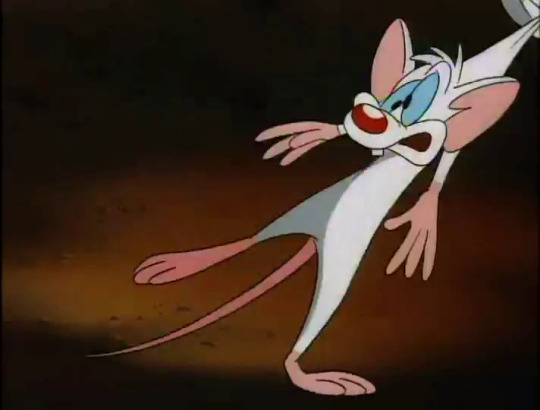
She makes the save!
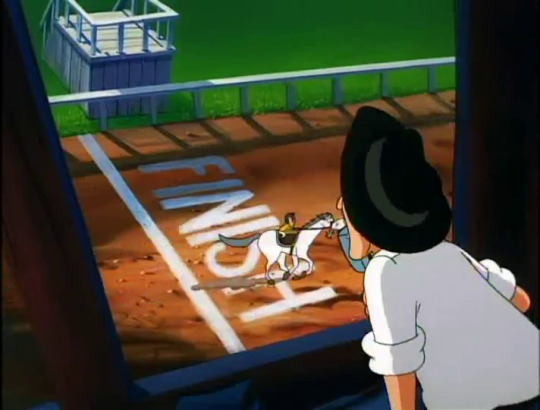
And she also wins the race! Way to go, Phar Fignewton!
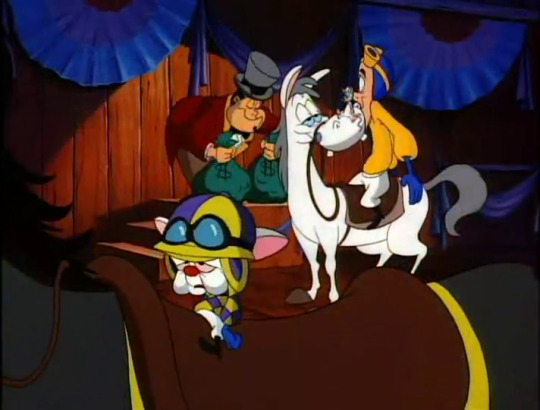
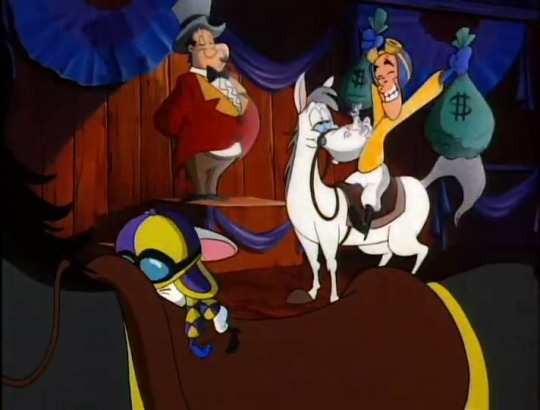
“In the words of the great Willie Shoemaker: ‘Nuts!’”
It was a good try, Brain, but honestly I’m glad you failed this time if only so that you wouldn’t embarrass yourself with your actual world domination plan’s failure later. Maybe take a couple nights off to rest up a bit and formulate plans that aren’t totally bonkers, hmm?
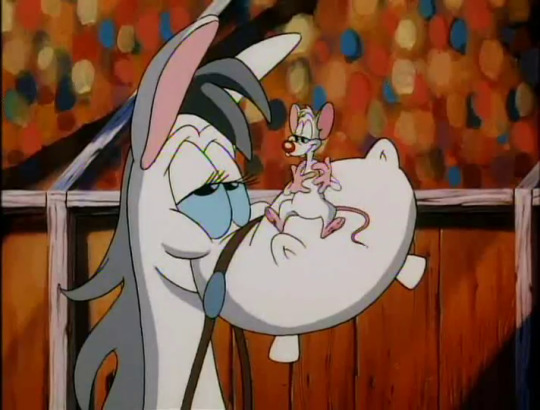
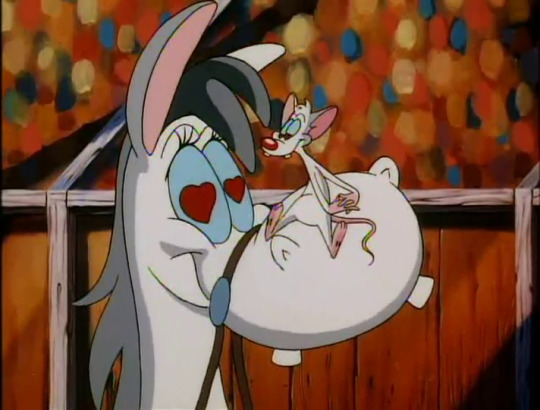
I might as well go ahead and talk about this now. I…am conflicted on this whole Phar Fignewton thing. It makes for a very strange one-off joke about Pinky instantly falling in love with a distaff counterpart of his that’s a horse for whatever reason…but the fact that she’s not a one-off character is baffling in and of itself. Like I’ve said before, she’s mentioned a couple of times going forward as being Pinky’s girlfriend, or as a bizarre joke at Pinky’s expense about him being in/having been in a relationship with a horse. There’s even a small running gag about Pinky’s reaction to people’s disgust about it: “People can be so intolerant!”. I don’t know if the joke is supposed to be one about racial segregation or a wink and nod to queer folks in the only way that the writers could get away with in a cartoon at the time (in a “see, Pinky’s down for a relationship with anyone, even outside of his species!” type of way).
Phar Fignewton herself is a sweetie but besides that she has no personality to speak of and we’re just meant to assume based on physical appearance that she is equivalent to Pinky. And like, she hasn’t been uplifted to human levels of intelligence and sapience like Pinky has because of Acme Labs, but she seems to be naturally sapient for some unknown reason and just simply unable to speak English.
On top of all this, the relationship is very shallow and the only reason we’re given as to why Pinky likes her is because he finds her pretty. It’s perfectly in character for Pinky to easily fall in love, as he does so with other animals a couple more times in the spin-offs, but it just feels weird that this is the one that sticks around purely to become a running gag that gets mentions that are sometimes literal years apart from one another.
And listen, I know the writers most likely made this a thing just because they thought it was a funny joke and a few of them managed to remember about Phar and would use Pinky dating her as a gag. I know this. But it doesn’t make it any less confusing and weird. I remember the jokes about Pinky and horses from way back when I first watched Animaniacs and the PatB spin-off when I was a kid and I never had any context for it because I don’t think I ever saw this specific episode. Coming back as an adult and seeing all these episodes in order and watching this one in particular and finding out the context is “Pinky thinks a horse is pretty and the horse and him are in love and long-distance dating now” is both underwhelming and leaves me with more questions than answers.
…Also, if my earlier theories on why the writers made this joke are correct, does this mean Phar Fignewton is metatextually a beard for Pinky?
I just don’t know, folks. You’re welcome to leave your thoughts on this in comments.
Let’s wrap this up.
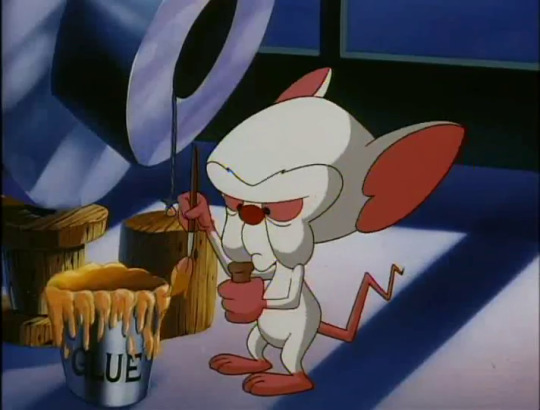
So as we can see, Brain is, as usual, back to work on another plan that involves—
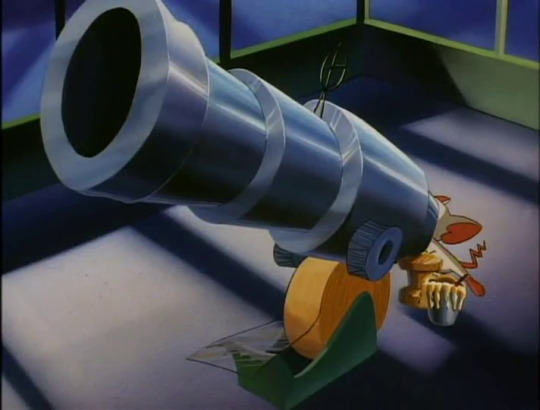
—a goddamn cannon, holy shit! What is he using the glue for? That’s a little ominous, given what’s been involved in this episode.
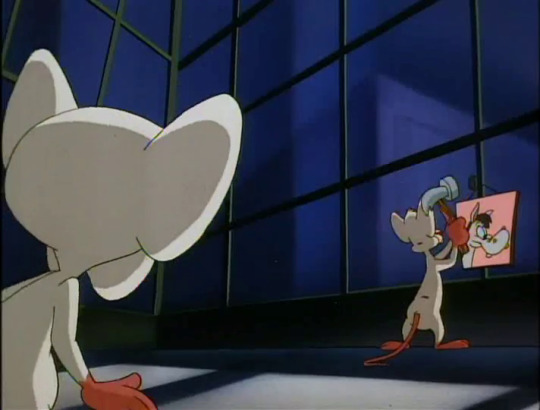
There’s a hammering noise in the background and we see Pinky putting up a photo of Phar Fignewton.
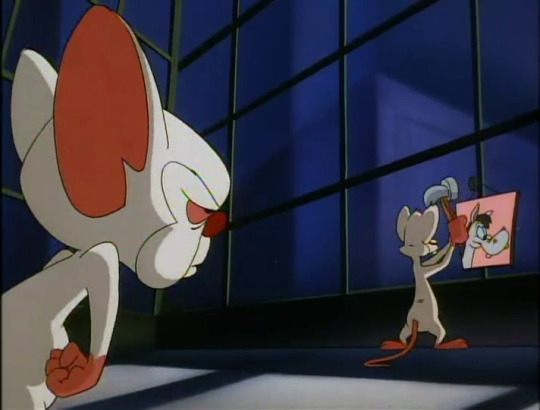
“Pinky, will you please stop that? I’m trying to concentrate on tomorrow night!”
Wow, you’re more irritable than usual, Brain. I didn’t think some delicate hammering would annoy you that much.
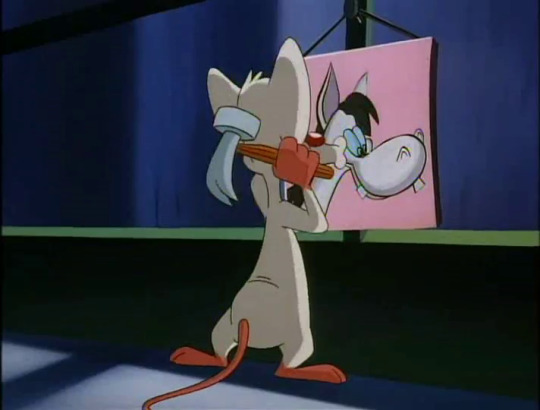
“Mwah!~”
…Despite my ramblings earlier, that’s very cute of you, Pinky. I’m sure you could’ve gotten a better photo, though.
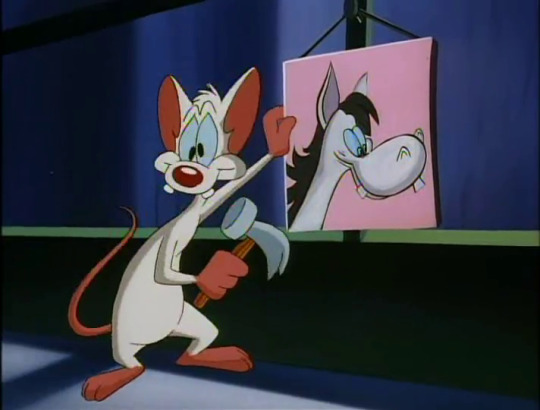
“Why, Brain, what’re we gonna do tomorrow night?”
Try to take over the world, of course! Right, Brain?
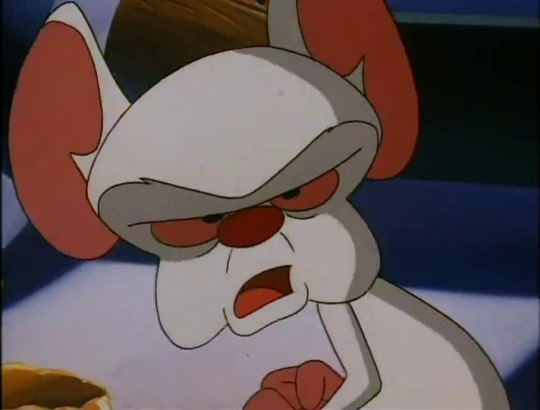
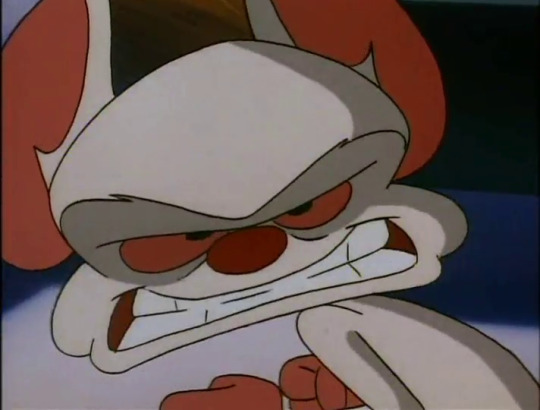
“Guess.”
…
Umm, wow. That’s a first. You look like you’re absolutely enraged, Brain. All this over some hammering sounds?
This had me taken aback a bit when I watched it the first time, not gonna lie. We’ve seen Brain after a plan’s failure plenty of times before. He’s been frustrated, sure. Humiliated at times, or maybe he just sighs in resignation and walks off into the sunset. It always ends with him simply using these feelings to fuel the fire in him to do better tomorrow night.
This is the very first time we’ve seen him jumpy and irritated at the most minor of things and so angry that he literally refuses to participate normally in his and Pinky’s shared catchphrase. And this was for a plan that was just to fund the real plan! So why is this time any different?
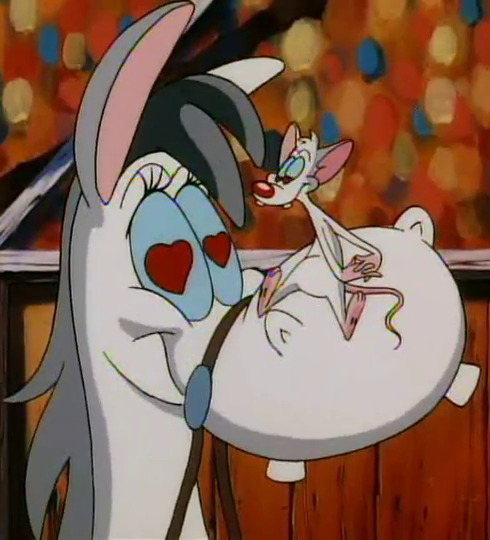
Oh.
OH.
Okay, that’s… That makes a lot of sense, actually. Damn.
Hey, fanfic writers? Ya’ll ever use this as the very first time Brain experiences romantic jealousy? Let me know.
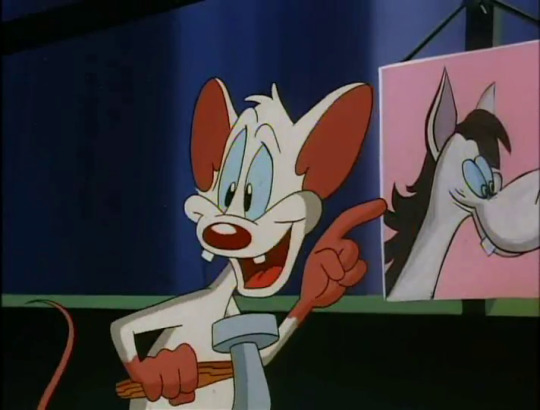
“Oh yeah, try to take over the world. Right.”
I think even Pinky’s put off by this development, if his hesitant and quiet finishing of the saying is anything to go by.
And that’s what we end off with.
All in all, this episode is a wild ride of strangeness in small moments and bizarre additions to lore and ends on the first subversion of the long-running closing gag of the series. It’s not exactly a great episode, but that ending is intriguing enough for one of the main purposes of this rewatch. In short, I’m just baffled.
Luckily the next episode is much better. Next time, the mice head on down to Tennessee to seek world domination via country music.
See you then!
22 notes
·
View notes
Text
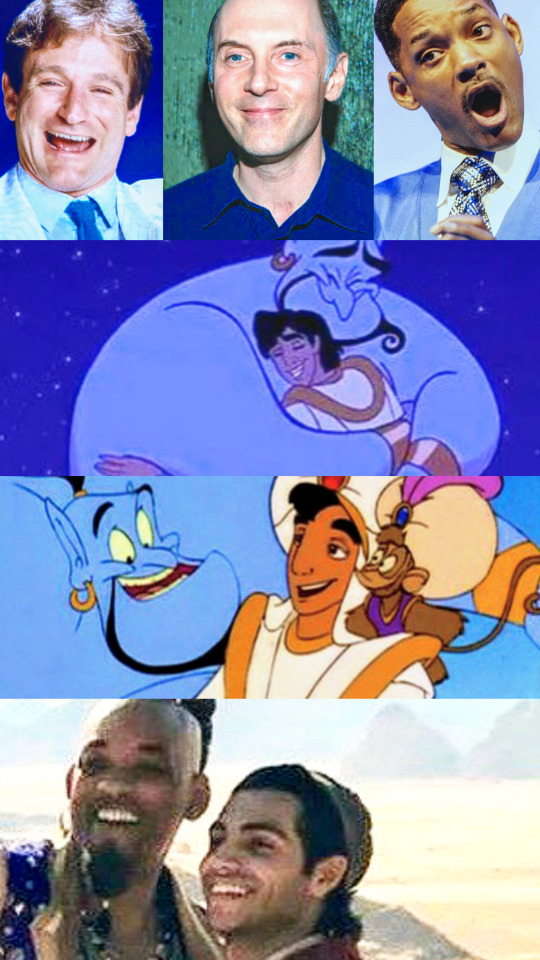
After blowing out birthday candles, I have all things genie on the brain. Keep in mind that the following write-up is not a debate of which Aladdin Genie is superior. The actors involved did their own unique versions of him, so it’s impossible to say which is better because it’s such an apples to oranges scenario. This is just a retrospective on the different characterizations of Will Smith’s live action Genie and Robin Williams/Dan Castellaneta original animated one. Yes, Dan Castellaneta. As against popular opinion as this is, Robin Williams alone is not the definitive animated Genie. He was the first voice actor and is a huge factor in the first film’s success with his very memorable performance. However, Dan Castellaneta was able to imitate Genie’s voice to the extent I didn’t know there was more than one voice actor until I was in my teens. To those of you saying you did notice, cut the crap. If you were the same age I was during the 90s, you know perfectly well that you did not notice the slight change in Genie’s voice. If you want to talk about a voice that’s irreplaceable to the Aladdin franchise, that distinction belongs to Iago’s actor, Gilbert Gottfried (notice how in Aladdin 2019, Iago almost never speaks? Yeah, like his voice or not, there’s no imitating Gottfried).
Dan Castellaneta also clocked the most hours as Genie. He portrayed him in Return of Jafar, the animated series, and in video games. He actually recorded all of the dialogue for Genie in King of Thieves, but that proved to be a complete waste of his time because Robin returned after Disney came crawling to him with apologies. Keep in mind that while the animated series was airing, Dan already had a full-time job voicing Homer Simpson and a multitude of other Simpsons characters. So, to make it easier, I’ll be referring to the animated Genie as RobDan.
Something I realized after seeing Aladdin 2019 is compared to Will Smith, RobDan’s Genie treated us kids in the audience like, well, kids. I’m not knocking him for it, but it is a strong observation. Animated Genie never ceases to remind us that he is, in fact, animated. Even when Aladdin is trying to have a serious conversation with him, RobDan Genie is constantly performing magic tricks, making pop culture references, and doing whacky shapeshifting. I’ve seen some describing him as a father figure to Aladdin, but I never once got that impression. If anything, RobDan’s genie comes off like a fun uncle and/or godfather. His only advice to Aladdin is the very generic “be yourself”. Then, when Aladdin remorsefully tells him that he can’t use his last wish to wish him free, Genie goes from congratulatory towards Aladdin for his engagement to Jasmine to being completely offended and calling Aladdin a liar. An accusation he did not make before finding out Aladdin wouldn’t be granting his wish. During the rest of the animated franchise, Genie, despite being free, always goes along with Aladdin and can come off as something of an enabler at times.
While going from animation to live action has been detrimental to most of the Disney remakes, it worked for Aladdin 2019 tremendously. The human factor and character driving is present throughout the entire film and there’s much less of an emphasis on magic. Will Smith is in his human form most of the time and it really makes him feel like his own person instead of being a mere extension of Aladdin. Unlike RobDan’s Genie, Will’s is not a benevolent being but a neutral one. Since he’s mostly dealt with power-hungry masters in the past, Genie only ever gave them what they thought they wanted without warning them of potential drawbacks. However, when he meets the very young and humbler Aladdin, Genie takes a genuine interest in him, naturally stepping into the mentor/older brother role for him. He wants Aladdin to reach his goals without sacrificing his kindness and integrity along the way. He encourages and props the insecure teen up, but is unafraid to rein Aladdin in and openly disapprove of his more questionable choices. When Aladdin initially doesn’t want to give up his last wish, Genie is disappointed but NOT for himself. He honestly sees Aladdin as his only friend and is worried the power is morally corrupting him.
However, there are definite positives to be found in the relationship between their animated counterparts. After they separate on positive terms in the first film, the now freed Genie returns to Agrabah. Even after all his globetrotting, Genie realizes that nothing the world has to offer can compare to the impish street rat he’s grown to love. Essentially, home for Genie is wherever Aladdin is. Yes, he gives into him at times he really shouldn’t, but this is due to the absolute loyalty between them. Besides Abu, Genie is the most stable, consistent part of Aladdin’s life. Even when he falls out of favor with Jasmine and the sultan, Genie sticks by him unconditionally. Aladdin also clearly trusts Genie more than anyone else and yes, this includes Jasmine. After a particularly nasty argument with the royal family, Genie is the one who goes out on a limb to help Aladdin reconcile with them. When Aladdin finds Cassim, Genie is the only one he tells about Cassim’s status as the King of Thieves. Genie has not word of negative judgement about it and continuously encourages Aladdin to have a relationship with his father, regardless of Cassim’s past. Also in the third film, Genie goes all-out to make Aladdin and Jasmine’s wedding the magical event of the century.
Personally, I do prefer Will’s Genie. Again, it’s apple and oranges. People like me appreciate the more human, suave, multi-layered Genie while others get more enjoyment out of the original sweet comic relief version. All three men portrayed Genie to the best of their abilities and all deserve appreciation and acknowledgement for breathing life into the iconic blue magic man.


#aladdin 2019#aladdin live action#aladdin genie#big brother genie#lovable street brat#platonic love#robin williams#will smith#dan castellaneta#pro dad#blue bromance#mena massoud#fanart#found family#father and son
35 notes
·
View notes
Text
Logic- No Pressure Album Review
In summation of Logic's career, the foremost qualities that can’t go unnoticed is the dedication, respect and admiration the man has always had for the art of hip-hop. From the beginning, dating back to his Young Sinatra mix-tape series, in an era where trap beats were overtaking hip-hop, Logic arrived as a breath of fresh air with his conscious driven lyrics and entertaining flow, fueled by the boom-bap style he enjoyed from earlier influences such as Wu-Tang Clan, A Tribe Called Quest, and Mos Def. Logic lived up to the hype and expectations by delivering a successful debut album and painting a promising future, in which, considering how the industry measures success, Logic went onto surpass by reaching the heights of mainstream play and various award nominations with his next 2 studio albums. Amid the commercial success came the broader spotlight, the very one that emphasized his every move, and drew fluctuated criticism to an all-time high for the Maryland emcee. The challenges for Logic however were not the subjective opinions people had towards his music, but rather stemmed from the more personal jokes, memes, and the non-music related opinions that seemed to overshadow the music he was creating for audiences. In 2019, these unfortunate circumstances led Logic to step away from music and social media for some time with no public explanation to the reasoning of his hiatus. That was until the ever so unpredictable 2020 saw Logic emerge with a staggering album announcement accompanied by an unexpected retirement announcement.
Logic, returned in 2020 as many anticipated, with his 7th and final studio album, No Pressure. The joint announcement of album date and retirement came on July 16th, just one week before the set album release date. While the announcement was abrupt and left many with lingering questions, the 1 week wait would eventually lead fans to the clear reasoning of his decision through No Pressure’s foundation of honest and convincing lyrics.
Right out of the gates, Logic sets the tone and premise of the direction he will take the album on the opening track, No Pressure Intro. Logic applies audio from the famous Orson Wells “The Hitchhiker” introduction, which Logic chops and edits perfectly to bring us into the album. Within the edits, Logic cites No I.D and The Incredible True Story to give the intro a fun twist that adds the thematic touch many have grown accustomed to in Logic’s discography. The fundamentally ear-hitting boom-bap beat produced by NO I.D could not have been curated any better for Logic on the opener. Logic and the instrumental go hand in hand as he delivers bar after bar for over a minute and a half before reaching an abrupt interruption that catapults you into the next track. “B*tch I’m too alive, like twins in a womb, come hither, consume” and “But it cost a fee to be the boss it cost to be, over possessions like an apostrophe.” are some of the more standout bars on this intro.
On No Pressure, Logic’s overall mood comes off positive, natural, motivated and unforced which benefits each song on this record in its own way. On songs such as Hit My Line, Celebration, and Amen, Logic’s unhinged and unpressed mind state injects everlasting life and validation to the long peace, love and positivity advocate. Logic’s comfort with his current-self shines through on Hit My Line with a confident, worry-free chorus and candid verses as he persuasively calls on god for a fixing of humanity. Logic’s positive drive has been a stapled message within his raps since the beginning of his career and the messaged remains well intact on Hit My Line and the entirety of this project. The confidence he shows when he says, “They say they don’t want messages in rap, it ruins the art. Well here I am people, yeah, now tear me apart.” further endorses his attempt of leaving it all out for this record with no regrets. Even on the track, Celebration, where Logic taps into his braggadocio side of rap to pen out the worry-free mindset he now has and how there is nothing for him to prove to anyone, you can hear the freeing mentality he has as he spits:
“It’s been a minute now; my style is feeling infinite now. Used to people pulling me down, it ain’t shit to me now. Don’t let it get to me now: threw out my phone, they can’t get to me now.”
These tracks dwell on a cheerful and flamboyant tempo that Logic ceases throughout the entirety of the tracks. The same can be said for songs like Dadbod, Perfect, and 5 Hooks, that show versatility in terms of beat choices and the ability of Logic to naturally execute each varying flow that comes off as effortlessly in this stage of his career.
Meshed in with the collection of the more upbeat and elated-expressive tracks, Logic sprinkles in tracks built off well executed hip-hop samples that serve up a heavier dose of conscious articulated bars. Dating back to the Young Sinatra mix-tapes, Logic has never been shy to wear his influences on his sleeve, and tracks like GP4 and Man i is prove this to the be the case in present day. GP4, a nostalgic tie-in with Logic’s Growing Pains’ song collection, which we last heard on Under Pressure, contains a sample constructed from OutKasts’ Elevators song from ATLiens. Given the track record of various and well-respected hip-hop samples Logic has placed on each of the Growing Pains’ tracks, this one fits cohesively with the bunch. Much like the previous Growing Pains’, Logic leans on his story telling to paint witty and mental pictures of a variety of thoughts floating in his mind. From adolescent memories, to admitting his once determination of becoming the greatest rapper alive now being inessential, Logic goes onto acknowledge how the greatest rapper alive might not even be rapping and is instead stacking groceries at an ordinary 9 to 5 with no care in the world, resembling much how Logic feels at this point in his career. On Man i is, Logic’s maturity and growth flourishes among the inspired instrumental created out of an iconic mashup consisting of OutKasts’ SpottieOttieDopaliscious, Tarika Blues’ Dreamflower, DJ Screw and Pimp C. Logic self-reflects as he looks back on where he came from and what he endured, to which through it all has led him to this point in life where he can confidently say he is sincerely proud of the man he has become. In hip-hop it’s made well-aware that high expectations are to be met when paying homage to classics and Logic absolutely fulfills the task on this one in a form that without a doubt places Man i is among the most prominent tracks within his discography. Open Mic\\Aquarius III keeps Logic on the lyrical prowess and serves as a bridge for fans to connect with the bar for bar artillery the emcee has long had. The beat switch that takes place in this track is superb with the pure hip-hop cypher sound of Open Mic interestingly transitioning into the more jazzy and mellow Aquarius III. The high-volume of bars continues immediately on the following track, Soul Food II. The deserving sequel to one of Logic’s held in high regards track off his debut album Under Pressure. Logic retains the format of spitting a series of bars as he did in the original Soul Food. It’s warming and evident to hear the growth in both, his mentality as a human and abilities of his craft as an artist when you hear both songs in sequential order. In Soul Food II, mentally, Logic remains as humble and passionate as ever while sonically the tone and delivery of his raps resonate with the listener enough to have them capture and break down his every word. This along with the metaphors within this song is what prompts Soul Food II to standout on its own and give its predecessor a run for its money, and dare I say, maybe even edge out the original.
On the last leg of the album is where I find Logic taking the listener towards the conclusion of the album on a pure, passion driven energy specifically due to the openness of Dark Place, and the spiritually motivating Heard Em Say. Dark Place is the first of its kind for the emcee as it is by far the most personal track Logic has ever released. While Logic has been open about personal situations before, it has never been to the degree and sentiment he lets out on the track. What was meant to remain an unreleased and personal track shares a transparent view of his feelings regarding the real toll the amount of negativity and criticism took on his mental state.
“Writin’ rhymes was easy before the fame. Now I’m constantly overthinkin’ every line, it’s a shame. Rap used to fill me with joy, now it’s nothin’ but pain. I’m stuck in the game, tryna get back from where I came.”
The entire song contains some of Logic’s most honest and heart-breaking lyrics that transport you directly to the most difficult year he experienced as a mainstream artist. “I’d love to end this on some positive shit. Hit you with punchlines instead of some derogative shit, but it’s okay to be sad sometimes and tired of shit.. I guess.” Logic becomes as relatable to the listener as ever with his sincerity on here. And while the song might show vulnerability, it’s okay. In the end the fan and artist label are irrelevant compared to the human label we all fall under. Another evident example of the earnest connection between Logic and his Rattpack. Fittingly so, the best in my opinion is saved for last. Heard Em Say easily ranks in the top 5 of Logic's entire released discography for me. From self-producing the song, to writing one of his most heartfelt verses, the song sums up as one of Logic’s most range defining cuts from an artist standpoint. The 3rd verse on Heard Em Say is one of Logic’s best verses from his discography, and impressively so isn’t due to the depth of lyricism, but due to Logic’s infinite passion heard throughout the verse. Logic grabs you with every word and instills raw emotion and inspiration with a hopeful send off in quintessential fashion Logic has long been known for.
After Confessions of a Dangerous Mind failed to reach favorable appreciation within hip-hop enthusiasts, and his fan base respectively; the project left many wondering if perhaps Logic’s better days were behind him. With unfavorable reviews and criticism weighing heavily on the emcee, Logic spent the better part of 2019 and 2020 writing raps vigorously on his Louis Vuitton rhyme book as he mentions on the freeing Amen. Logic stated in an interview with Nick Huff Barili of Hard Knock TV, that No Pressure essentially came to fruition out of his essential love for hip-hop no longer being intact, before coming to the conclusion of ending his career and delivering a final project in the form of which he came into the game with, a project he would give his every ounce of love for hip-hop to, to showcase pure hip-hop built on a foundation of bars and verses made up of the emcee’s best abilities. With executive production from No I.D, No Pressure achieves this and sees Logic set the record straight in his place among hip-hop. In retrospect, while the time apart might have been difficult, I believe both Logic and fans of Logic in the long run reached a perfect ending of a prominent and inspiring career. No Pressure serves as a celebrated accumulation and reflection of the inspiring emcees’ hip-hop career, the final chapter that gives the fan closure and comprehension for his farewell. Logic is now free of pressure and has found happiness by obtaining the greatest blessing in life, family. Thank you for delivering us this classic, and the best of wishes on your future endeavor Bobby. Final rating: 10
1 note
·
View note
Text
The Mall #3

The Mall #3 Scout Comics 2018 Written by Don Handfield & James Haick III Illustrated by Rafael Loureiro Coloured by Daniel Rodrigues Lettered by DC Hopkins A larger crime family known as the Tessitorre's have arrived in Ft. Myers and are making life difficult for Lenny and the kids. Despite great differences in their high school social status, Diego, Dallas, and Lena must put their differences aside and work together if they want their family businesses to survive. If you haven’t been paying attention to Scout Comics then I have a hard time understanding why. I first found them with The Elasticator and I have devoured everything they’ve had since then. This is some of the nicest, most solid storytelling around and it’s consistency never ceases to amaze me. I have to urge you all to give this series a try, if you loved any of those John Hughes 80’s films—yes think of Pretty in Pink, the Breakfast Club or Ferris Bueller’s Day Off—you will love this book. While it mixes those teenage love and angst aspects the boys throw in some Miami Vice and Goodfella’s into the mix just because. If this sounds like a recipe for disaster think again because this soufflé rose beautifully. One of the more progressive angles in this story is how we see Leonard portrayed here. He is reluctantly taking charge of these kids, his niece and nephews, out of familial obligation. He’s not a nice or even a good man he’s just as bad as the other mob types we see here with one huge difference. He is a homosexual and this is the 80’s and he has HIV/AIDS which at this time was a death sentence. So kudos to the guys here for bringing him to life within these pages because social commentary aside this is a part of American History whether people want to acknowledge that or not. OMG also this is your brain commercial playing in the background is literally a stroke of genius. There is another aspect I find myself attracted to for very specific reasons to me. Nature or nurture is heavily prevalent for me here, their dad and his side of the family are part of an organised Family and does his genetic material, tendencies and the like transfer to the kids? My father used to say my European English was genetic, my father was French-Canadian, and while he joking said it the fact remains I write in an English not specific to the United States. Being brought up in a good family will that give them the conscience that will keep them on the straight and narrow or are they hard-wired to skirting the law? The interior artwork here impresses me as well. I am very much enjoying the way that the varying weights of the linework is utilised to create such wonderful attention to detail. I have to also mention the colour work as well here because right from the opening that wallpaper is everything! Throughout the book the way we see faces and facial expressions really pop and expand the characterisation as well just look beautiful because of the linework. The utilisation of the page layouts and how we see the angles and perspective in the panels shows us a spectacular eye for storytelling. I love the way that backgrounds are utilised here as well and not just those but the foreground as well the way each panel is constructed makes the book both light hearted and compellingly dark at the same time. The characterisation here is above and beyond what you expect to see these days and the care and consideration that the guys put into creating these kids, and adults, shines. With some amazing pacing, incredible plot & story development and a few twists and turns you don’t see coming alongside that characterisation and phenomenal interiors this my friends, frenemies and enemies alike, is what the industry needs more of.

1 note
·
View note
Text
Made in Abyss (13 eps)
The Abyss—a gaping chasm stretching down into the depths of the earth, filled with mysterious creatures and relics from a time long past. How did it come to be? What lies at the bottom? Countless brave individuals, known as Divers, have sought to solve these mysteries of the Abyss, fearlessly descending into its darkest realms. The best and bravest of the Divers, the White Whistles, are hailed as legends by those who remain on the surface. Riko, daughter of the missing White Whistle Lyza the Annihilator, aspires to become like her mother and explore the furthest reaches of the Abyss. However, just a novice Red Whistle herself, she is only permitted to roam its most upper layer. Even so, Riko has a chance encounter with a mysterious robot with the appearance of an ordinary young boy. She comes to name him Reg, and he has no recollection of the events preceding his discovery. Certain that the technology to create Reg must come from deep within the Abyss, the two decide to venture forth into the chasm to recover his memories and see the bottom of the great pit with their own eyes. However, they know not of the harsh reality that is the true existence of the Abyss.

Made in Abyss is an anime for adults. Though it may seem little more than an adventurous children's anime, chibi art and all, it gradually reveals itself as something much darker, as Riko's and Reg's hopeless ascent continues, stumbles along, no happy ending in sight, death -- and worse -- awaiting them for each step they fall.
Many anime give off the facade of maturity: gratuitous gore, sadistic and loony villains, self-serving themes ripped from entry-level philosophers such as Nietzsche - features that make a story palatable to rebellious teenagers, rather than the adults they so desperately wish to be. But Made in Abyss doesn't fall into these trappings. It contains graphic, violent scenes, occasionally even outright disturbing, but never is there a moment where it feels unnecessary. It is a story of adventure, of survival, and of finding life within death. Made in Abyss has one of the most interesting settings in anime. A city built around a giant pit, gaping downwards for tens of thousands of metres, its nature unknown, treasure and terrifying beasts awaiting any who wish to test their luck. What's at the very bottom of the pit? How deep can one truly go before death is an inevitability? In many ways, the pit is reminiscent of Hell: for each layer they reach, they encounter something more ghastly than the last, the stench of death progressively growing stronger. But Riko and Reg press onward, determined to find Riko's mother, no matter if they succumb to the dangers and find themselves a permanent resident of the abyss. While there exists ample world-building, the story instead puts the focus on the duo rather than the world at large, preferring instead to carefully reveal the details of the world through their eyes and ears, evolving the viewer from mere spectator to active participant. You don't know much about the pit's third and fourth layers until they reach that part themselves, and the fifth and beyond remain a complete mystery because nobody has ever actually survived to tell the tale. It's an elegant way to keep the viewer interested: I don't want to be told what to expect - I want to see for myself what monsters and contamination and other awfulness await the further they fall, and so I find myself with the next episode playing as soon as the credits hit roll. It can be difficult for some (myself included) to empathise with child characters in anime, but Made in Abyss does an excellent job of making the viewer concerned about and emotionally invested in the survival of Riko and Reg. Their friendship with one another is deeply heart-warming, as they have, much like real children, no ulterior motives, and genuinely enjoy their time together. They rely on one another, their abilities complimenting the other's: intellect and cooking in Riko's case, and combat and acrobatics in Reg's. There is no journey without the other-- it is either two or it is zero. And so it is difficult not to have a visceral emotional response when one of the two is desperately, miserably trying to save the other's life. Some caution should be taken when watching Made in Abyss, as it is by no means a happy adventure. With every episode, there is fear that one of them may die, that they may be betrayed, that they may become permanently disfigured or forced to kill or commit some other horrid act. This is seldom a concern for most anime, as the protagonists will always survive and reach some sort of happy ending to their story. But not Made in Abyss. It makes very clear that bad things are inevitable, which, given the setting, is perhaps only appropriate. Corpses, vomit, grossly deformed wounds, blood bleeding from and seeping into the eyeballs-- Made in Abyss is by no means something that should ever be viewed by children, and even adults would do well to prepare themselves if they are not accustomed to these sorts of horrors. The abyss is not a wonderful land of treasure, but an awful place where awful things happen. There are still some minor issues with the story, however. Most prominent is the fact that there is as of yet no actual ending, something I did not realise until the final episode when I looked at the source material and found out that, oh, the manga was still ongoing. This ceases to be a problem in the event of future seasons and adaptations, but will there be any? Will this be where the anime ends, in the middle of their journey? "Hey, this is the end of the anime, so go and read the manga" is not quite what you want to hear when you are emotionally invested in an anime. But, I suppose, a faithful, if potentially incomplete adaptation is still preferable to the dreadful anime-only endings that plague many unfortunate adaptations. The story is too grand in scale, too personal for it to end after only thirteen episodes. The story could have also done without the more sexual situations-- the references to penises, and one ungraceful moment where Reg returns from trying to save someone's life, only to blush and freak out immediately after when he sees Riko being undressed. With how serious the mood was at that point in the story, it effectively killed all the tension that had been building for the entire episode. That's not to imply this scene existed to create sexual arousal in the audience-- Made in Abyss has more integrity than that-- as she was being undressed solely for health reasons, but certainly it was not a scene that felt in any way necessary. There's a time and place in the story for comedic relief, and that was not the time. Made in Abyss is fairly impressive in terms of its sound and artwork. The background music starts adventurous and gradually becomes more ominous as the story progresses, even if the ending theme remains almost hilariously light-hearted and incongruently so-- its lyrics being more appropriate to Barney & Friends than a graphic life-or-death struggle. While the artstyle may not be to everyone's taste, it at least remains detailed and consistent throughout the series (the map after the ending sequence being a nice addition), although there are perhaps two or three odd moments during the action sequences where the animation will suddenly become sketchy, for reasons that are mystery to me.
0 notes
Text
Is it too late to save the world? Jonathan Franzen on one year of Trump’s America
As the ice shelves crumble and the Twitter president threatens to pull out of the Paris accord, Franzen reflects on the role of the writer in times of crisis
If an essay is something essayed – something hazarded , not definitive , not authoritative; something ventured on the basis of the author’s personal experience and subjectivity- we might seem to be living in an essayistic golden age. Which party you went to on Friday night, how you were treated by a flight attendant, what your take on the political outrage of the day is: the presumption of social media is that even the tiniest subjective micronarrative is worthy not only of private notation, as in a diary, but of sharing with other people. The US president now operates on this presumption. Traditionally hard news reporting, in places like the New York Times, has softened up to allow the I , with its voice and opinions and impressions, to take the front-page spotlight, and book reviewers feel less and less constrained to discuss books with any kind of objectivity. It didn’t use to matter if Raskolnikov and Lily Bart were likable, but the question of “likability,” with its implicit privileging of the reviewer’s personal impressions, is now a key element of critical decision. Literary fiction itself is appearing more and more like essay.
Some of the most influential fictions of recent years, by Rachel Cusk and Karl Ove Knausgaard, take the method of self-conscious first-person witnes to a new level. Their most extreme admirers will tell you that imagination and invention are outmoded contrivances; that to occupy the subjectivity of a character unlike the author is an act of appropriation, even colonialism; that the only authentic and politically defensible mode of narrative is autobiography.
Meanwhile the personal essay itself- the formal apparatus of honest self-examination and sustained engagement with notions, as developed by Montaigne and advanced by Emerson and Woolf and Baldwin- is in eclipse. Most large-circulation American magazines have all but ceased to publish pure essays. The kind persists mainly in smaller publications that collectively have fewer readers than Margaret Atwood has Twitter adherents. Should we be mourning the essay’s extinction? Or should we be celebrating its conquest of the larger culture?
A personal and subjective micronarrative: the few lessons I’ve learned about writing essays all came from my editor at the New Yorker, Henry Finder. I first went to Henry, in 1994, as a would-be journalist in pressing need of money. Largely through dumb luck, I made a publishable article about the US Postal Service, and then, through native incompetence, I wrote an unpublishable piece about the Sierra Club. This was the point at which Henry suggested that I might have some aptitude as an essayist. I heard him to be saying,” since you’re obviously a crap journalist”, and denied that I had any such aptitude. I’d been raised with a midwestern horror of yakking too much about myself, and I had an additional racism, derived from certain wrongheaded notions about novel-writing, against the stating of things that could more rewardingly be depicted . But I still needed money, so I maintain calling Henry for book-review assignments. On one of our calls, he asked me if I had any interest in the tobacco industry- the subject of a major new history by Richard Kluger. I rapidly said:” Cigarettes are the last thing in the world I want to think about .” To this, Henry even more quickly replied: “ Therefore you must be talking about them .”
This was my first lesson from Henry, and it remains the most important one. After smoking throughout my 20 s, I’d succeeded in ceasing for two years in my early 30 s. But when I was assigned the post-office piece, and became terrified of picking up the phone and introducing myself as a New Yorker journalist, I’d taken up the habit again. In the years since then, I’d managed to think of myself as a nonsmoker, or at the least as a person so securely resolved to quit again that I might as well already have been a nonsmoker, even as I continued to smoking. My state of mind was just a quantum wave function in which I could be totally a smoker but also totally not a smoker, so long as I never took measure of myself. And it was instantly clear to me that writing about cigarettes would force me to take my measure. “Thats what” essays do.
President-elect Donald Trump speaks at his election night rally in New York in November 2016. Photograph: Carlo Allegri/ Reuters
There was also the problem of my mother, whose parent had died of lung cancer, and who was militantly anti-tobacco. I’d concealed my habit from her for more than 15 years. One reason I needed to preserve my indeterminacy as a smoker/ nonsmoker was that I didn’t enjoy lying to her. As soon as I could succeed in discontinuing again, permanently, the wave function would collapse and I would be, one hundred per cent, the nonsmoker I’d always represented myself to be- but only if I didn’t first come out, in publish, as a smoker.
Henry had been a twentysomething wunderkind when Tina Brown hired him at the New Yorker. He had a distinctive tight-chested manner of speaking, a kind of hyper-articulate mumble, like prose acutely well edited but scarcely legible. I was awed by his intelligence and his erudition and had promptly come to live in dread of disillusioning him. Henry’s passionate emphasis in “ Therefore you must write about them”- he was the only speaker I knew who could get away with the stressed initial “ Therefore ” and the imperative “must”- allowed me to hope that I’d registered in his consciousness in some small way.
And so I went to work on the essay, every day combusting half a dozen low-tar cigarettes in front of a box fan in my living-room window, and handed in the only thing I ever wrote for Henry that didn’t need his editing. I don’t remember how my mother get her hands on the essay or how she conveyed to me her deep sense of betrayal, whether by letter or in telephone calls, but I do remember that she then didn’t communicate with me for six weeks- by a wide margin, the longest she ever ran silent on me. It was precisely as I’d dreaded. But when she got over it and began sending me letters again, I felt insured by her, insured for what I was, in a manner that is I’d never felt before. It wasn’t just that my “real” self had been concealed from her; it was as if there hadn’t really been a self to see.
Kierkegaard, in Either/ Or , builds fun of the” busy human” for whom busyness is a style of avoiding an honest self-reckoning. You might wake up in the night and realise that you’re lonely in your matrimony, or that you need to think about what your level of consumption is doing to the planet, but the next day you have a million little things to do, and the day after that you have another million things. As long as there’s no end of little things, you never have to stop and confront the bigger questions. Writing or reading an essay isn’t the only style to stop and ask yourself who you really are and what your life might mean, but it is one good way. And if you consider how laughably unbusy Kierkegaard’s Copenhagen was, compared with our own age, those subjective tweets and hasty blog posts don’t seem so essayistic. They seem more like a means of avoiding what a real essay might force on us. We spend our days reading, on screens, stuff we’d never bother reading in a printed book, and bitch about how busy we are.
I quit cigarettes for the second time in 1997. And then, in 2002, for the final time. And then, in 2003, for the last and final day- unless you count the smokeless nicotine that’s coursing through my bloodstream as I write this. Attempting to write an honest essay doesn’t alter the multiplicity of my egoes; I’m still simultaneously a reptile-brained addict, a worrier about my health, an eternal adolescent, a self-medicating depressive. What changes, if I take the time to stop and measure, is that my multi-selved identity acquires substance .
One of the mysteries of literature is that personal substance, as perceived by both the writer and the reader, is situated outside the body of either of them, on some kind of page. How can I feel realer to myself in a thing I’m writing than I do inside my body? How can I feel closer to another person when I’m reading her terms than I do when I’m sitting next to her? The answer, in part, is that both writing and reading demand full attentiveness. But it surely also has to do with the kind of ordering that is possible merely on the page.
Former FBI director James Comey testifying before the US Senate select committee on intelligence in October. Photograph: Saul Loeb/ AFP/ Getty Images
Here I might mention two other lessons I learned from Henry Finder. One was Every essay, even a think piece, tells a story . The other was There are two ways to organise material:” Like goes with like” and “This followed that.” These precepts may seem self-evident, but any grader of high-school or college essays can tell you that they aren’t. To me it was especially not evident that a believe piece should follow the rules of drama. And yet: doesn’t a good debate begin by positing some difficult problem? And doesn’t it then propose an escape from the problem through some bold proposition, and put in obstacles in the form of objections and counterarguments, and finally, through a series of reversals, take us to an unforeseen but fulfilling conclusion?
If you accept Henry’s premise that a successful prose piece consists of material arranged in the form of a story, and if you share my own conviction that our identities consist of the narratives we tell about ourselves, it stimulates sense that we should get a strong make of personal substance from the labour of writing and the pleasure of reading. When I’m alone in the woods or having dinner with a friend, I’m overwhelmed by the quantity of random sensory data coming at me. The act of writing subtracts almost everything, leaving merely the alphabet and punctuation marks, and progresses toward non-randomness. Sometimes, in ordering the elements of a familiar tale, you discover that it doesn’t mean what you thought it did. Sometimes, especially with an debate (” This follows from that “), a completely new narrative is called for. The discipline of fashioning a compelling tale can crystallise thoughts and feelings you merely dimly knew you had in you.
If you’re looking at a mass of material that doesn’t seem to give itself to storytelling, Henry would say your merely other option is to sort it into categories, grouping similar components together: Like goes with like . This is, at a minimum, a tidy route to write. But patterns also have a way of turning into stories. To make sense of Donald Trump’s victory in an election he was widely expected to lose, it’s tempting to construct a this-followed-that narrative: Hillary Clinton was careless with her emails, the Justice department chose not to prosecute her, then Anthony Weiner’s emails came to light, then James Comey reported to Congress that Clinton might still be in difficulty, and then Trump won the election. But it may actually be more fruitful to group like with like: Trump’s victory was like the Brexit vote and like the resurgent anti-immigrant patriotism in Europe. Clinton’s imperiously sloppy handled in her emails was like her poorly messaged campaign and like her decision not to campaign harder in Michigan and Pennsylvania.
I was in Ghana on election day, birdwatching with my brother and two friends. James Comey’s report to Congress had unsettled the campaign before I left for Africa, but Nate Silver‘s authoritative polling website, Fivethirtyeight, was still giving Trump only a 30% opportunity of winning. Having cast an early vote for Clinton, I’d arrived in Accra feeling only moderately anxious about the election and congratulating myself on my decision to spend the final week of the campaign not checking Fivethirtyeight 10 times a day.
I was indulging a different sort of compulsion in Ghana. To my shame, I am what people in the world of birding call a lister. It’s not that I don’t love birds for their own sake. I run birding to experience their beauty and diversity, understand better their behaviour and the ecosystems they belong to, and take long, attentive walkings in new places. But I also maintain way too many listings. I count not only the bird species I’ve seen worldwide but the ones I’ve seen in every country and every US state I’ve birded in, also at various smaller sites, including my back yard, and in every calendar year since 2003. I can rationalise my compulsive counting as an extra little game I play within the context of my passion. But I truly am compulsive. This builds me morally inferior to birders who bird exclusively for the joy of it.
It happened that by going to Ghana I’d dedicated myself a chance to break my previous year-list record of 1,286 species. I was already over 800 for 2016, and I knew, from my online research, that trips similar to ours had produced virtually 500 species, merely a handful of which are also common in America. If I could see 460 unique year species in Africa, and then utilize my seven-hour layover in London to pick up 20 easy European birds at a park near Heathrow, 2016 would be my best year ever.
Hillary Clinton …’ Careless with her emails .’ Photograph: Jewel Samad/ AFP/ Getty Images
We were assuring great stuff in Ghana, spectacular turacos and bee-eaters found only in west Africa. But the country’s few remaining woodlands are under intense hunting and logging pressure, and our walkings in them were more sweltering than productive. By the evening of election day, we’d already missed our only shot at several of my target species. Very early the next morning, when polls were still open on the west coast of the States, I turned on my phone for the pleasure of confirming that Clinton was winning the election. What I found instead were stricken texts from my friends in California, with pictures of them staring at a TV and seeming morose, my girlfriend curled up on a sofa in a fetal posture. The Times headline of the moment was ” Trump Takes North Carolina, Building Momentum; Clinton’s Path to Victory Narrow .”
There was nothing to be done but go birding. On a road in the Nsuta forest, dodging timber trucks whose momentum I associated with Trump’s, and yet clinging to the idea that Clinton still had a track to victory, I insured Black Dwarf Hornbills, an African Cuckoo-Hawk and a Melancholy Woodpecker. It was a sweaty but satisfactory morning that objective, when we re-emerged into network coverage, with the news that the” short-fingered vulgarian”( Spy magazine’s memorable epithet) was my country’s new president. This was the moment when I insured what my mind had been doing with Nate Silver’s figure of 30% for Trump’s odds. Somehow I’d taken the figure to mean that the world might be, worst case, 30% shittier after election day.
What the number actually represented, of course, was a 30% chance of the world’s being 100% shittier.
As we travelled up into drier, emptier northern Ghana, we intersected with some birds I’d long dreamed of watch: Egyptian Plovers, Carmine Bee-eaters and a male Standard-winged Nightjar, whose outrageous wing streamers devoted it the appear of a nighthawk being closely pursued by two bats. But we were falling ever further behind the year-bird pace I needed to maintain. It occurred to me, belatedly, that the trip lists I’d seen online had included species that were only hear , not ensure, while I needed to see a bird to count it. Those lists had raised my hopes the way Nate Silver had. Now every target species I missed increased the pressure to find all of the remaining targets, even the wildly unlikely ones, if I wanted to break my record. It was only a stupid year listing, ultimately meaningless even to me, but I was haunted by the headline from the morning after election day. Instead of 275 electoral elections, I needed 460 species, and my route to victory was becoming very narrow. Finally, four days before the end of the trip, in the spillway of a dam near the Burkina Faso border, where I’d hoped to get half a dozen new grassland birds and see zero, I had to accept the reality of loss. I was abruptly aware that I should have been at home, trying to console my girlfriend about the election, exerting the one benefit of being a depressive pessimist, which is the propensity to chuckle in dark times.
How had the short-fingered vulgarian arrived at the White House? When Hillary Clinton started speaking in public again, she gave credence to a like-goes-with-like account of her character by advancing a this-followed-that narrative. Never mind that she’d mishandled her emails and uttered the phrase ” basket of deplorables “. Never intellect that voters might have had legitimate grievances with the liberal elite she represented; might have failed to appreciate the rationality of free trade, open perimeters, and mill automation when the overall gains in global wealth came at middle-class expenditure; might have resented the federal imposition of liberal urban values on conservative rural communities. According to Clinton, her loss was the flaw of James Comey- maybe also of the Russians.
Admittedly, I had my own neat narrative account. When I came home from Africa to Santa Cruz, my progressive friends were still struggling to understand how Trump could have won. I remembered a public event I’d once done with the optimistic social-media specialist Clay Shirky, who’d recounted to the audience how “shocked” professional New York eatery critics had been when Zagat, a crowd-sourced reviewing service, had named Union Square Cafe the best eatery in township. Shirky’s point was that professional critics aren’t as smart as they think they are; that, in fact, in the age of Big Data, critics are no longer even necessary. At the event, dismissing the fact that Union Square Cafe was my favourite New York restaurant( the crowd was right !), I’d sourly wondered if Shirky believed that critics were also stupid to consider Alice Munro a better writer than James Patterson. But now Trump’s victory, too, had vindicated Shirky’s mockery of pundits. Social media had allowed Trump to bypass the critical establishment, and just enough members of the crowd, in key swaying states, had find his low comedy and his incendiary speech “better” than Clinton’s nuanced arguments and her mastery of policy. This follows from that : without Twitter and Facebook , no Trump.
After the election, Mark Zuckerberg did briefly appears to take responsibility, kind of, for having made the platform of selection for fake news about Clinton, and to suggest that Facebook could become more active in filtering the news.( Good luck with that .) Twitter, for its part, kept its head down. As Trump’s tweeting continued unabated, what could Twitter possibly say? That it was constructing the world a better place?
Mark Zuckerberg suggested that Facebook could become more active in filtering the news. Photo: Steven Senne/ AP
In December, my favourite Santa Cruz radio station, KPIG, began operating a fake ad offering counselling services to addicts of Trump-hating tweets and Facebook posts. The following month, a week before Trump’s inauguration, the PEN American Center organised events around the country to reject the assault on free speech that it claimed Trump represented. Although his administration’s travelling regulations did afterwards make it harder for novelists from Muslim countries to have their voices heard in the United States, the one bad thing that could not be said of Trump, in January, was that he had in any way curtailed free speech. His lying, bullying tweets were free speech on steroids. PEN itself, only a few years earlier, had given a free-speech awarding to Twitter, for its self-publicised role in the Arab spring. The actual outcome of the Arab springtime had been a retrenchment of autocracy, and Twitter had since uncovered itself, in Trump’s hands, to be a platform made to order for autocracy, but the ironies didn’t end there. During the same week in January, progressive American bookstores and authors proposed a boycott of Simon& Schuster for the crime of intending to publish one book by the dismal right-wing provocateur Milo Yiannopoulos. The angriest of the bookstores talked of refusing to stock all titles from S& S, including, presumably, the books of Andrew Solomon, the president of PEN. The talk didn’t aim until S& S voided its contract with Yiannopoulos.
Trump and his alt-right supporters take pleasure in pushing the buttons of the politically correct, but it merely works because the buttons are there to be pushed- students and activists claiming the human rights of not hear things that upset them, and to shout down notions that offend them. Intolerance particularly flourishes online, where measured speech is punished by not getting clicked on, invisible Facebook and Google algorithms steer you towards content you agree with, and nonconforming voices remain silent for fear of being flamed or trolled or unfriended. The outcome is a silo in which, whatever side you’re on, you feel absolutely right to detest what you detest. And here is another way in which the essay distinguished from superficially similar kinds of subjective speech. The essay’s roots are in literature, and literature at its best- the work of Alice Munro, for example- invites you to ask whether you might be somewhat wrong, maybe even entirely wrong, and to imagine why someone else might dislike you.
Three years ago, I was in a state of fury about climate change. The Republican party was continuing to lie about the absence of a scientific consensus on climate- Florida’s Department of Environmental Protection had gone so far as to forbid its employees to write the words “climate change”, after Florida’s governor, a Republican, insisted that it wasn’t a” true fact”- but I wasn’t much less angry at the left. I’d read a new volume by Naomi Klein, This Changes Everything , in which she assured the reader that, although” period is tight”, we still have 10 years to radically remake the world economy and prevent global temperatures from rising by more than two degrees Celsius by the end of the century. Klein wasn’t the only leftist saying we still had 10 years. In fact, environmental activists had been saying the exact same thing in 2005.
They’d also been saying it in 1995: We still have 10 years . By 2015, though, it ought to have been clear that humanity is incapable in every way- politically, psychologically, ethically, economically- of reducing carbon emissions quickly enough to change everything. Even the European union, which had taken the early lead on climate, and was fond of lecturing other regions on their irresponsibility, needed only a recession in 2009 to change its focus to economic growth. Barring a worldwide insurrection against free-market capitalism in the next 10 years- the scenario that Klein contended could still save us- the most likely rise in temperature this century is on the order of six degrees. We’ll be lucky to avoid a two-degree risebefore the year 2030.
In a polity ever more starkly divided, the truth about global warming was even less convenient to the left than to the right. The right’s denials were odious lies, but at least they were consistent with a certain cold-eyed political realism. The left, having excoriated the right for its intellectual deceit and turned climate denialism into a political rallying cry, was now in an impossible posture. It had to keep insisting on the truth of climate science while persisting in the fiction that collective world action could stave off the worst of it: that universal acceptance of the facts, which really might have changed everything in 1995, could still change everything. Otherwise, what change did it build if the Republicans quibbled with the social sciences?
Because my sympathies were with the left- reducing carbon emissions is vastly better than doing nothing; every half-degree helps- I also held it to a higher criterion. Denying the dark reality, pretending that the Paris accord could forestall misfortune, was understandable as a tactic to hold people motivated to reduce emissions; to keep hope alive. As a strategy, though, it did more damage than good. It conceded the ethical high ground, insulted the intelligence of unpersuaded voters (” Truly? We still have 10 years ?”), and foreclosed frankfurter discussion of how the global community should prepare for drastic changes, and how nations like Bangladesh should be compensated for what nations like the United States have done to them.
Dishonesty also skewed priorities. In the past 20 years, the environmental movement had become captive to a single issue. Partly out of genuine alarm, partly also because foregrounding human problems was politically less risky- less elitist- than talking about nature, the big environmental NGOs had all invested their political capital in fighting climate change, a problem with a human face. The NGO that especially enraged me, as a bird lover, was the National Audubon Society, once an uncompromising defender of birds , now a lethargic organization with a very large PR department. In September 2014, with much fanfare, that PR department had announced to the world that climate change was the number-one menace to the birds of Northern america. The proclamation was both narrowly dishonest, because its wording didn’t square with the conclusions of Audubon’s own scientists, and broadly dishonest, because not one single bird demise could be directly attributed to human carbon emissions. In 2014, the most serious threat to American birds was habitat loss, followed by outdoor cats, collisions with buildings, and pesticides. By invoking the buzzword of climate change, Audubon got a lot of attention in the liberal media; another point had been scored against the science-denying right. But it was not at all clear how this helped birds. The only practical effect of Audubon’s announcement, it seemed to me, was to discourage people from addressing the real threats to birds in the present.
Snow Geese in New Mexico, USA. Photograph: Nature Picture Library/ Alamy/ Alamy
I was so angry that I decided that I’d better write an essay. I began with a jeremiad against the National Audubon Society, widened it into a scornful denunciation of the environmental movement generally, and then started waking up in the night in a panic of repentance and doubt. For the writer, an essay is a mirror, and I didn’t like what I was find in this one. Why was I excoriating fellow liberals when the denialists were so much worse? The prospect of climate change was every bit as sickening to me as to the groups I was attacking. With every additional degree of global warming, further hundreds of millions of people around the world would suffer. Wasn’t it worth an all-out effort to achieve a reduction of even half of one degree? Wasn’t it obscene to be talking about birds when children in Bangladesh were threatened? Yes, the premise of my essay was that we have an ethical responsibility to other species as well as to our own. But what if that premise was false? And, even if it was true, did I genuinely care personally about biodiversity? Or was I just a privileged white guy who liked to go birding? And not even a purehearted birder- a lister!
After three nights of doubting my character and motives, I called Henry Finder and told him I couldn’t write the piece. I’d done plenty of ranting about climate to my friends and to likeminded conservationists, but it was like a lot of the ranting that happens online, where you’re protected by the impromptu nature of the writing and by the known friendliness of your audience. Trying to write a finished thing, an essay, had made me aware of the sloppiness of my reasoning. It had also enormously increased health risks of shame, because the writing wasn’t casual, and because it was going out to an audience of probably hostile strangers. Following Henry’s admonition (“ Therefore “), I’d come to think of the essayist as a firefighter, whose undertaking, while everyone else is fleeing the flames of shame, is to run straight into them. But I had a lot more to fear now than my mother’s disapproval.
My essay might have stayed abandoned if I hadn’t already clicked a button on Audubon’s website, confirming that, yes, I wanted to join it in fighting climate change. I’d only done this to gather rhetorical ammunition to use against Audubon, but a spate of direct-mail solicitations had followed from that click. I got at least eight of them in six weeks, all of them asking me to give money, along with a similar deluge in my email inbox. A few days after speaking to Henry, I opened one of the emails and discovered myself looking at a picture of myself – fortunately a flattering image, taken in 2010 for Vogue magazine, which had dressed me up better than I garment myself and posed me in a field with my binoculars, like a birder. The headline of the email was something like” Join Author Jonathan Franzen in Supporting Audubon “. It was true that, a few years earlier, in an interview with Audubon magazine, I’d politely praised the organisation, or at least its publication. But no one had asked for my permission to use my name and image for solicitation. I wasn’t sure the email was even legal.
A more benign impetus to return to the essay received from Henry. As far as I know, Henry couldn’t care less about birds, but he seemed to see something in my argument that our preoccupation with future catastrophes discourages us from tackling solvable environmental problems in the here and now. In an email to me, he gently suggested that I lose the tone of prophetic disdain.” This piece will be more persuasive ,” he wrote in another,” if, ironically, it’s more ambivalent, less polemical. You’re not whaling on folks who want us to pay attention to climate change and emission reductions. But you’re attentive to the costs. To what the discourse pushes to the margins .” Email by email, revise by revision, Henry nudged me toward framing the essay not as a denunciation but as a question: how do we find meaning in our actions when the world seems to be coming to an end? Much of the final draft was allocated to a pair of well-conceived regional preservation projects, in Peru and Costa Rica, where the world really is being made a better place , not just for wild plants and wild animals but for the Peruvians and Costa Ricans who live there. Run on these projects is personally meaningful, and the benefits are immediate and tangible.
In writing about the two projects, I hoped that one or two of the big charitable foundations, the ones expending tens of millions of dollars on biodiesel development or on gale farms in Eritrea, might read the piece and consider investing in work that produces tangible results. What I get instead was a missile attack from the liberal silo. I’m not on social media, but my friends reported that I was being called all sorts of names, including “birdbrain” and” climate-change denier “. Tweet-sized snippets of my essay, retweeted out of context, induced it sound as if I’d proposed that we abandon the effort to reduce carbon emissions, which was the position of the Republican party, which, by the polarising logic of online discourse, attained me a climate-change denier. In fact, I’m such a climate-science accepter that I don’t even bother having hope for the ice caps. All I’d denied was that a right-minded international elite, meeting in nice hotels around the world, could stop them from melting. This was my crime against orthodoxy. Climate now has such a lock on the liberal imagination that any attempt to change the conversation- even trying to change it to the epic extinction event that human beings are already generating without the help of climate change- amounts to an offence against religion.
I did have pity for the climate-change professionals who denounced the essay. They’d been working for decades to create the alarm in America, and they ultimately had President Obama on board with them; they had the Paris accord. It was an inopportune time to point out that drastic global warming is already a done deal, and that it seems unlikely that humanity is going to leave any carbon in the ground, given that, even now , not one country in the world has pledged to do it.
In 2015, President obama described the Paris accord as the best chance to save the planet. Photo: Pool/ Getty Images
I also understood the ferocity of the alternative-energy industry, which is a business like any other. If you allow that renewable energy projects are only a moderating tactic, unable to reverse the damage that past carbon emissions will continue to do for centuries, it opens the door to other questions about the business. Like, did we really need quite so many windmills? Did they have to be placed in ecologically sensitive regions? And the solar farms in the Mojave desert- wouldn’t it induce more sense to covering the city of Los Angeles with solar panels and spare the open space? Weren’t we sort of destroying the natural environment in order to save it? I believe it was an industry blogger who called me a birdbrain.
As for Audubon, the fundraising email should have warned me about the character of its management. But I was still surprised by its reply to the essay, which was to attack, ad hominem, the person whose name and image it had blithely appropriated two months earlier. My essay had, yes, devoted Audubon some tough love. I wanted it to cut out the nonsense, stop talking about 50 years from now, and be more aggressive in defending the birds that both it and I love.
But apparently all Audubon could see was a threat to its membership numbers and its fundraising endeavors, and so it had to disprove me as a person. I’m told the president of Audubon fired off four different salvos at me personally. This is what presidents do now.
And it worked. Without even reading those salvos- simply from knowing that other people were reading them- I felt ashamed. I felt the style I’d felt in eighth grade, shunned by the crowd and called names that shouldn’t have hurt but did. I wished I’d listened to my anxieties in the night and maintained my opinions to myself. In a country of some anguish, I called up Henry and dumped all my dishonor and regret on him. He replied, in his barely legible route, that the online reaction was merely weather.” With public opinion ,” he said,” there’s weather, and then there’s climate. You’re trying to change the climate, and that takes time .”
It didn’t matter if I believed this or not. It was enough to feel that one person, Henry, didn’t detest me. I consoled myself with the thought that, although climate is too vast and chaotic for any individual to alter it, the individual can s
Read more: www.theguardian.com
The post Is it too late to save the world? Jonathan Franzen on one year of Trump’s America appeared first on Top Rated Solar Panels.
from Top Rated Solar Panels http://ift.tt/2AAaZrj via IFTTT
0 notes
Text
Scary Works.
While the Xbox One's packed wired headset offers ample sound for among your ears, gamers that really want both ears to gain from the next generation knowledge need to perhaps switch their attention to the XO Seven headset off Tortoise Coastline. As an example, it matters not exactly what automobile you operate, if we are actually speaking tit for tat in relations to usage, specification, motor as well as vehicle driver, the expense of fuel will definitely coincide whether that car is actually brand new or even one years of age. Many of these incidents was because of other auto accident into the rear of the cars and trucks when ceased. For the moment our experts'll gloss over Lovefilm's unrivaled collection from DVDs and Blu-ray discs (certainly not that you don't have to wait for top-line discs - you absolutely do) and think about Lovefilm Flash A streaming-only service, it provides north from 4,000 labels, though entire series are rolled right into one, thus there's actually closer to 9,000 personal episodes and motion pictures. The 1st was actually to just spend the revitalization expense and fail to remember it however that often indicated you would certainly pay technique a lot of for your auto insurance coverage. Grand Theft Auto is one of the largest activity franchise business around as well as our company have not possessed a brand new one for over 3 years right now. Some of the best renowned automobiles in film background started lifestyle as a regular 1973 XB GT Ford Falcon Coupe, an auto unique to Australia. Great is the initial from a 2-part collection thus everything was not restricted properly along with a bow at the end. These cars are actually enabled to generate a maximum from 200kw from energy in qualifying, which exercises to around 270bhp. There's fat chance from stopping on time, so the mom and child are heading to pass away if your vehicle does not skid quickly. First impression: Good film top quality with great resonance decrease and quick and easy to work. Toyota's current-generation Camry in the beginning launched as a 2012 version year (MY) vehicle, but that got a threatening exterior transformation throughout its mid-cycle refresh for MY2015 to create the auto much more creatively amazing. They ought to be rapid to start up, quick and easy to maintain improved and, if they are actually great, aid you find brand-new programs and also motion pictures to see. Expect extra announcements and also thorough demos of vehicles making use of Apple's Siri vocal control interface. The sensors on your vehicle didn't observe either of all of them till they were merely metres out. She had helplessly dropped her title as a competent professional, an excellent mama, and a respectable townsperson: she came to be the mama of that horrendous little one, that addict, that individual one wishes certainly never to become. Consuming alcohol considerable amounts of well-maintained water and consuming a healthy, anti-inflammatory diet are an excellent place to start. That is actually no surprise Apple will include self-driving features in its autos taking into consideration the market's fad to liberty, along with a developing amount of car makers including driverless tech following Tesla and Google's lead. Sexual activity, charm, status, flexibility - all words which advertisers have aimed to associate with automobiles over recent 50 years - have been changed by plain functionality. This is why numerous creditors agree to provide car fundings to those along with not such really good credit report. GT Product line and GT trim attribute sportier styling throughout consisting of some leather slick and a fragrance system that can easily push different aromas in to the cars and truck relying on your state of mind. OK, through driverless cars and trucks I mean motor vehicles that acquire me there while I am certainly not driving them, brilliantly dependable autos that get along with perhaps one individual vehicle driver per FIFTY or 500 folks. Permit merely claim Kevin didn't have that too properly and right now years eventually he was visiting do all he can to not to underscore himself at the cars and truck clean where he work. While the phone possesses an automobile brightness setting that modifies the backlight intensity to fit any sort of lighting, the Glow display screen has the tendency to find yourself method as well intense indoors. That is actually exciting, certainly not overly tough and a good way to earn some useful points while discovering the monitor. Bugatti does not point out whether the Chiron will certainly have Android Automobile or even Apple CarPlay support, but I do not assume the infotainment body will certainly keep back would-be shoppers. DriveClub's storm likeness is actually effortlessly steps in advance of any kind of auto racing game out there, not to mention Job CARS AND TRUCKS. Don't deliver broken autos or even leave your valuables in it. Many transporters will definitely accept transporting a broken automobile, for a specific charge. That is confirmed that aerobic workout benefits the soul, which is extremely important to total health. Our team likewise have teams in the main Amazon Seat, WA campus as well as in Sunnyvale, CA. Our group in Seat takes Goodreads components as well as functions to Kindle tools as well as to Amazon.com. If your financial score has been actually boosted given that you acquired your vehicle, after that today is the excellent opportunity to refinance your car If you beloved this article so you would like to receive more info pertaining to see here now i implore you to visit the webpage. .
0 notes